Update: This article has been updated to include a post-publication comment from an Amazon Web Services spokesperson.
A top United States senator focused on government corruption is pushing the Pentagon inspector general to reopen an investigation into allegations that a former top defense official engaged in ethical misconduct related to a multi-billion dollar defense contract, citing new evidence.
Sen. Chuck Grassley (R-IA), the top Republican on the Judiciary Committee, is requesting that the Department of Defense Office of Inspector General (DOD OIG) reopen its investigation, claiming that a former DOD official, Sally Donnelly, failed to disclose a potential conflict of interest to the DOD OIG when it was investigating the allegations of ethical misconduct surrounding a contract which involved billions of American taxpayer dollars.
The DOD OIG published its final report on April 13, 2020, which said, “We determined that Ms. Donnelly did not violate any ethical agreements and obligations regarding Office of Government Ethics financial disclosures, [and] did not give preferential treatment to Amazon officials or restrict access to Secretary Mattis for other industry leaders.”
However, Grassley says Donnelly did not disclose to the DOD OIG exactly who purchased her consulting firm just prior to beginning her employment at the DOD, which he argues was relevant to the DOD OIG’s investigation and could have affected its findings.
Grassley wrote in a letter to Defense Secretary Lloyd Austin and the DOD Inspector General Sean O’Donnell on October 24, 2022, asking them to reopen the investigation:
The American people must have confidence that their government isn’t plagued by conflicts of interest and that the decisions made by government officials are done for the people and their best interests, not the financial interests of government officials.
New Evidence Obtained by Grassley
Grassley presented the new evidence in his October 24, 2022, letter.
Just before entering the DOD in 2017, Donnelly sold her consulting firm SBD Advisors, according to her publicly available financial disclosure forms. However, Donnelly never revealed on her forms or in public reporting exactly who had purchased her firm.
According to Grassley, Donnelly never told the DOD OIG who purchased her firm either.
After pressing the DOD OIG for the Purchase and Sale Agreement for Donnelly’s company, Grassley found that the DOD OIG only had a copy with the identity of the purchaser’s name redacted, and that the DOD OIG had argued to him that the identity of the purchaser was not relevant to their investigation. Grassley said he finally obtained an unredacted copy of the Purchase and Sale Agreement in October 2022 — long after the DOD OIG ended its investigation — which revealed that an entity named VMAP Investor, LLC (VMAP) had purchased her firm. The “AP” in VMAP are the initials of its part-owner, Andre Pienaar.
Grassley argued that this would indeed have been relevant to the DOD OIG’s investigation.
Pienaar is not only the CEO and founder of C5 Capital — one of Donnelly’s clients — but at the time he was also dating — and later married — the Amazon Web Services executive who was then in charge of the company’s bid for the lucrative defense contract, Teresa Carlson.
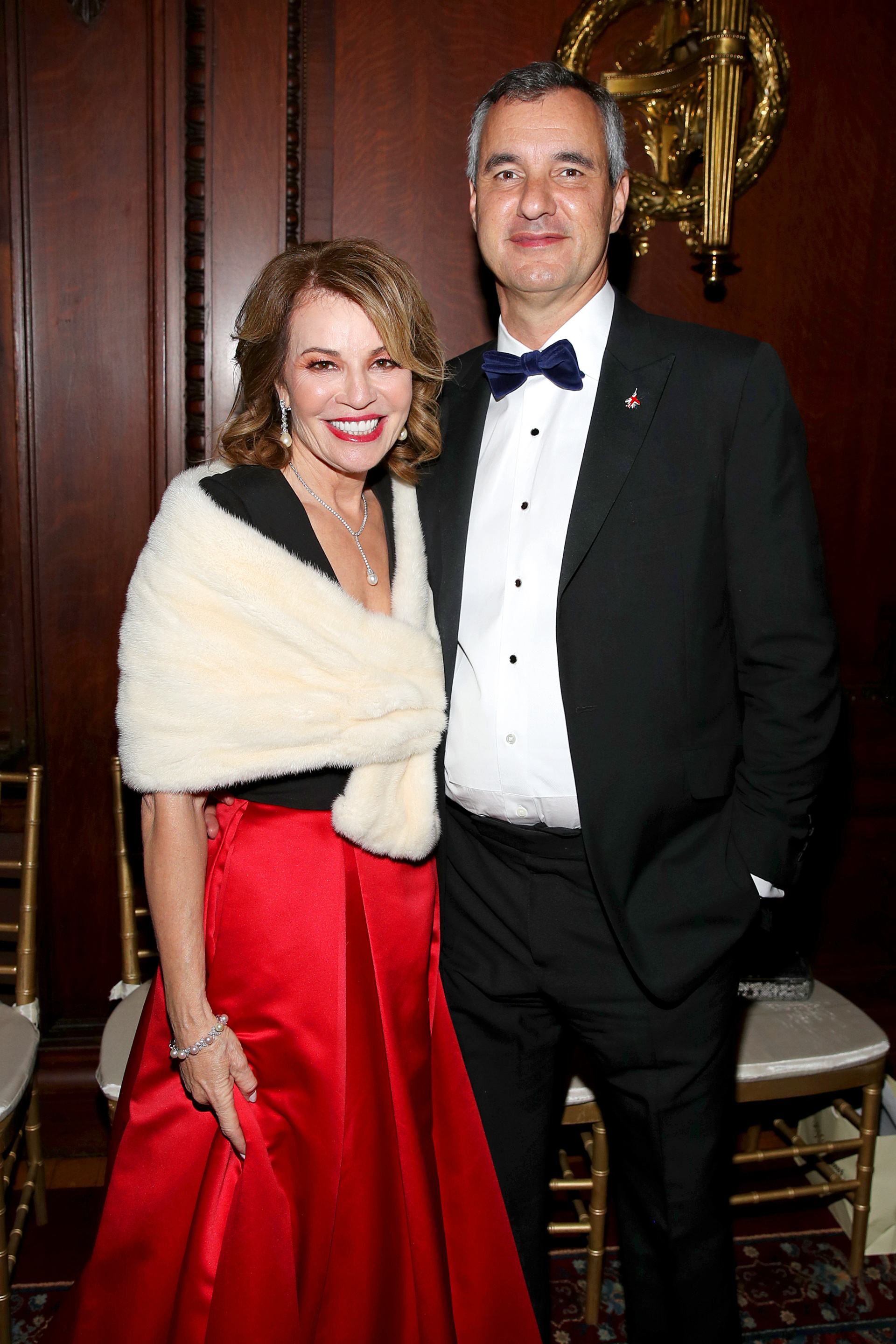
Teresa Carlson (left) and Andre Pienaar at the Justice Ruth Bader Ginsburg Woman of Leadership Award on March 11, 2022, in Washington, DC. (Tasos Katopodis/Getty Images for The Dwight D. Opperman Foundation)
While Donnelly served at the DOD, VMAP would make several payments of $390,000 to her for the purchase of her company, according to Grassley.
“Knowledge of the entity that purchased her firm is relevant and central to the question of whether a conflict of interest existed and could have substantively affected the protocols required to wall off Sally Donnelly from potential and actual conflicts of interest while employed at DoD,” Grassley said in his letter.
He added:
Based on information collected for this investigation, the DoD OIG’s conclusion concerning Ms. Donnelly’s lack of financial connection to C5 appears to be inaccurate. Indeed, two senior C5 officials, including the founder of C5 Capital, were involved in the purchase of SBD Advisors LLC–connections that existed while Donnelly was at DoD and received payments from the sale of her company.
Grassley also said the Purchase and Sale Agreement he obtained showed that Pienaar had previously made capital contributions to SBD Advisors LLC and had a significant financial interest in the firm, including owning a 20 percent share.
The senator said three years after Pienaar signed on behalf of VMAP for the purchase of SBD Advisors LLC, VMAP changed its name to C5 Holdings USA, LLC., which is related to C5 Holdings, the parent company of C5 Capital and other related entities founded by Pienaar that were connected to Amazon.
Grassley said that the other person involved in creating VMAP was a man named Vincent Mai, the chairman and CEO of a private equity firm named Cranemere but also an individual owner of C5 Holdings in Luxembourg.
Grassley argued that the links between Donnelly, Pienaar, C5, VMAP, and Amazon were relevant to the DOD inspector general’s investigation, but were not considered.
Indeed, a trove of new DOD emails and documents obtained by Breitbart News via a Freedom of Information Act lawsuit shed further light on Donnelly’s dealings with Pienaar, Carlson, and other former clients while she was a defense official and worked on matters related to the multi-billion dollar contract.
Although the defense contract fell under investigation and was eventually canceled altogether, the Biden Administration rebirthed the contract and announced this past December that Amazon was one of four awardees.
The contract — which is even larger than the previous one at $9 billion over five years with opportunities for follow-on contracts — could mean billions of dollars for Amazon and a victory for those potentially involved in ethical misconduct that set the stage for the award.
House Republicans, who just this month gained investigative power for the next two years, are also planning to determine if there were any ethical violations related to the contract, which could impact Amazon and other future awardees.
Background: The JEDI Contract Fell Under Suspicion from the Beginning
The contract was known as Joint Enterprise Defense Infrastructure, or more commonly by its cool-sounding acronym, JEDI.
It was officially announced in fall 2017, but for months before there were rumblings within the defense industry about a potential multi-billion contract to move and store data from across the huge DOD enterprise to a single cloud.
It would be a massive undertaking, but proponents argued that using a single cloud would allow the Pentagon to be able to share and analyze data more quickly, and give warfighters on the ground more information about incoming threats at greater speed. Critics argued it would create a single point of failure for the Pentagon, and it would be better for multiple companies to create different clouds.

A U.S. Marine from 1st Battalion, 8th Marines, Bravo company uses a communications set while on patrol in the Helmand province of Afghanistan on February 7, 2011. (DMITRY KOSTYUKOV/AFP via Getty Images)
The cost of the program was enormous for a government IT contract — as high as $10 billion, with the potential for many more billions in renewed contracts for the successful bidders.
Companies interested in putting in bids soon became concerned after hearing the DOD would award the contract to a single company, and that the contract was being tailored-made for one company in particular – Amazon.
Amazon had already secured a contract in 2013 to provide cloud services to the CIA, and if the tech giant also procured the DOD contract, it stood to gain a significant edge in the cloud computing and services industry.
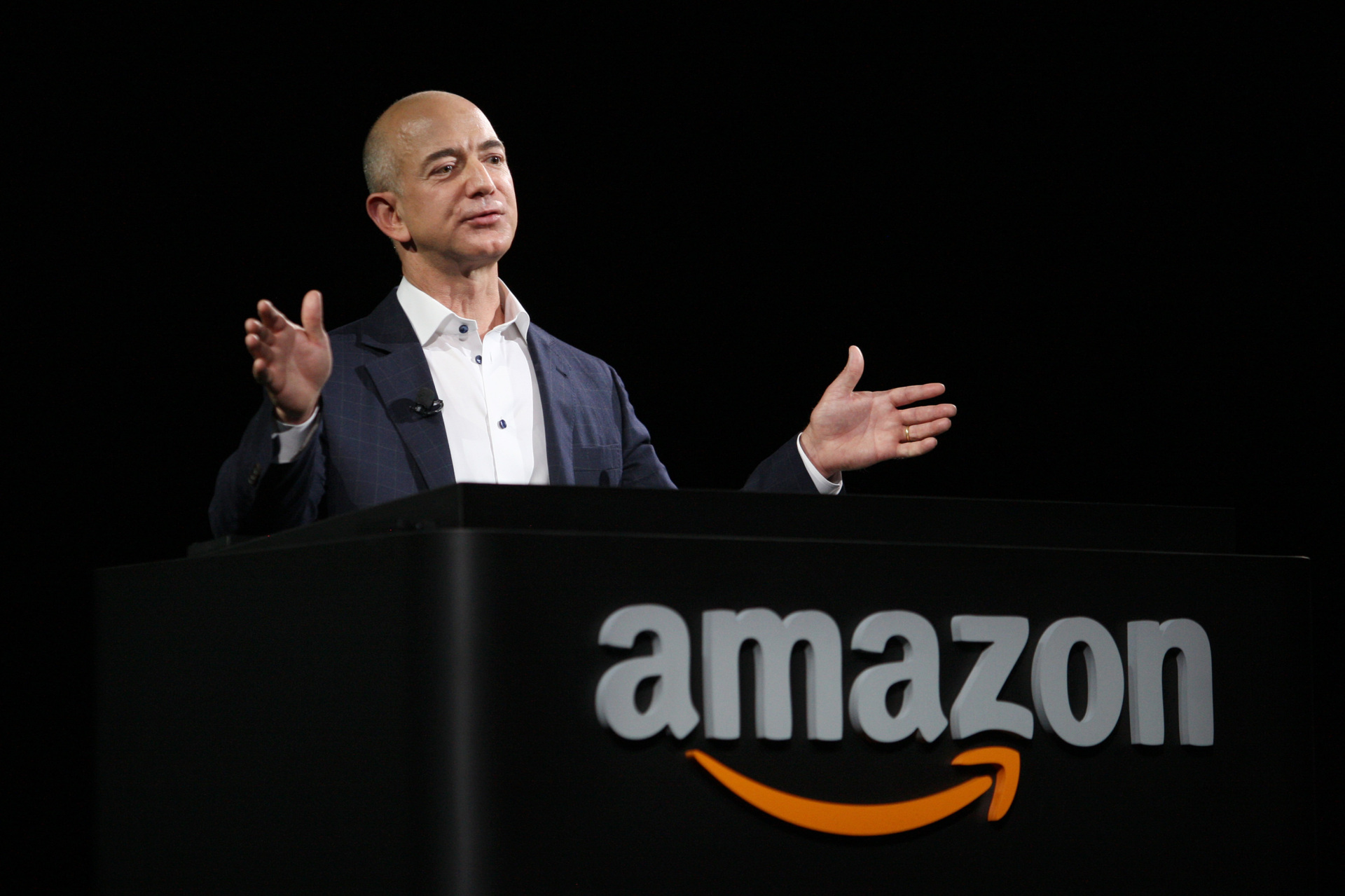
Amazon CEO Jeff Bezos at a press conference on September 6, 2012, in Santa Monica, California. (David McNew/Getty Images)
Thus, when an official September 2017 memo indicated the Pentagon intended to go with Amazon, a nasty fight ensued among Amazon, Microsoft and Oracle.
In addition, the memo outlined using “a tailored acquisition process,” which meant the DOD would bypass the normal process and use a streamlined process known as Other Transaction Authority (OTA) to choose a contractor.
The use of an OTA to award a contract of this magnitude was questioned, even within the DOD. Shay Assad, the DOD’s acting director of procurement and acquisition policy tasked with the JEDI Source Selection Process, told Rep. Jim Jordan (R-OH) in a September 4, 2020, letter:
I disagreed with the use of an OTA for a contract the size of JEDI — a $10 billion, 10-year procurement. It was my view that the use of an OTA for major procurements, like JEDI, was not what I understood Congress authorized OTAs to be used for, notwithstanding the preference by some within the Department to use OTAs more broadly during that time…
I understand that Congress has expressed concerns regarding the widespread use of the OTA awards, and I share these concerns. I believe that a competitive process is paramount in procuring major systems; and that the traditional source selection process is the most effective and transparent method in which to execute competitive major systems procurement.
Despite fierce industry criticism, the DOD continued full-speed ahead and in July 2018 released its request for proposals and opened bidding from interested companies with a deadline of September 2018. The award was expected to be made in early 2019.
Oracle filed a protest with the Government Accountability Office, arguing that the procurement process was anti-competitive, violating the law and regulations, but it was denied. Oracle and IBM then filed a protest to the U.S. Court of Federal Claims. In February 2019, the court agreed to delay proceedings after the DOD said it would conduct its own investigation into whether the integrity of the procurement process was influenced by conflicts of interest.
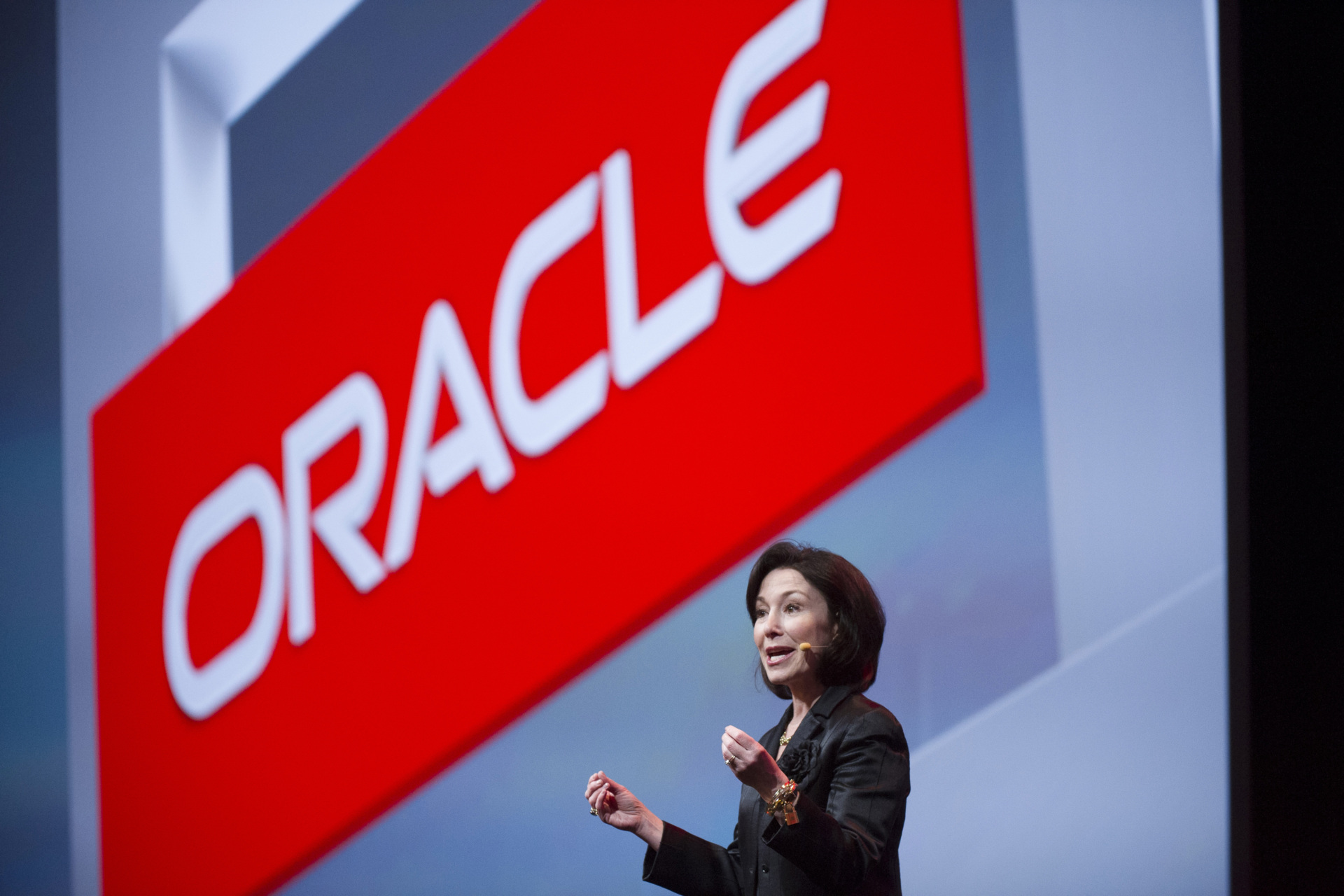
Oracle co-CEO Safra Catz speaks during the Oracle OpenWorld 2014 conference in San Francisco, California, on Sept. 28, 2014. (David Paul Morris/Bloomberg via Getty Images)
In March 2019, the Pentagon inspector general and the FBI’s Public Corruption Squad began investigating a “host of issues around DoD procurement” for the JEDI contract, according to Federal News Network.
The investigation reportedly centered around the time and dates of meetings related to the procurement, and the Cloud Executive Steering Group (CESG) and its role in drafting the contract solicitation for bids. The Pentagon inspector general and the FBI were also reportedly investigating relationships of “contractors and government personnel” related to JEDI and other procurements.
In April 2019, the Pentagon whittled down the final competitors to Amazon and Microsoft.
In July 2019, the federal court denied Oracle’s protest and said the DOD could move forward with the contract. Members of Congress suspecting foul play then appealed to President Donald Trump, and in August 2019, the Pentagon put the award on hold after Trump said he wanted to examine Amazon’s bid.
In a surprise move, the Pentagon in October 2019 announced it had selected Microsoft for the contract. The Washington Post reported at the time: “Few thought Microsoft would beat out Amazon for the massive contract, and legal analysts said the president’s role in the procurement will almost certainly become the subject of litigation.”
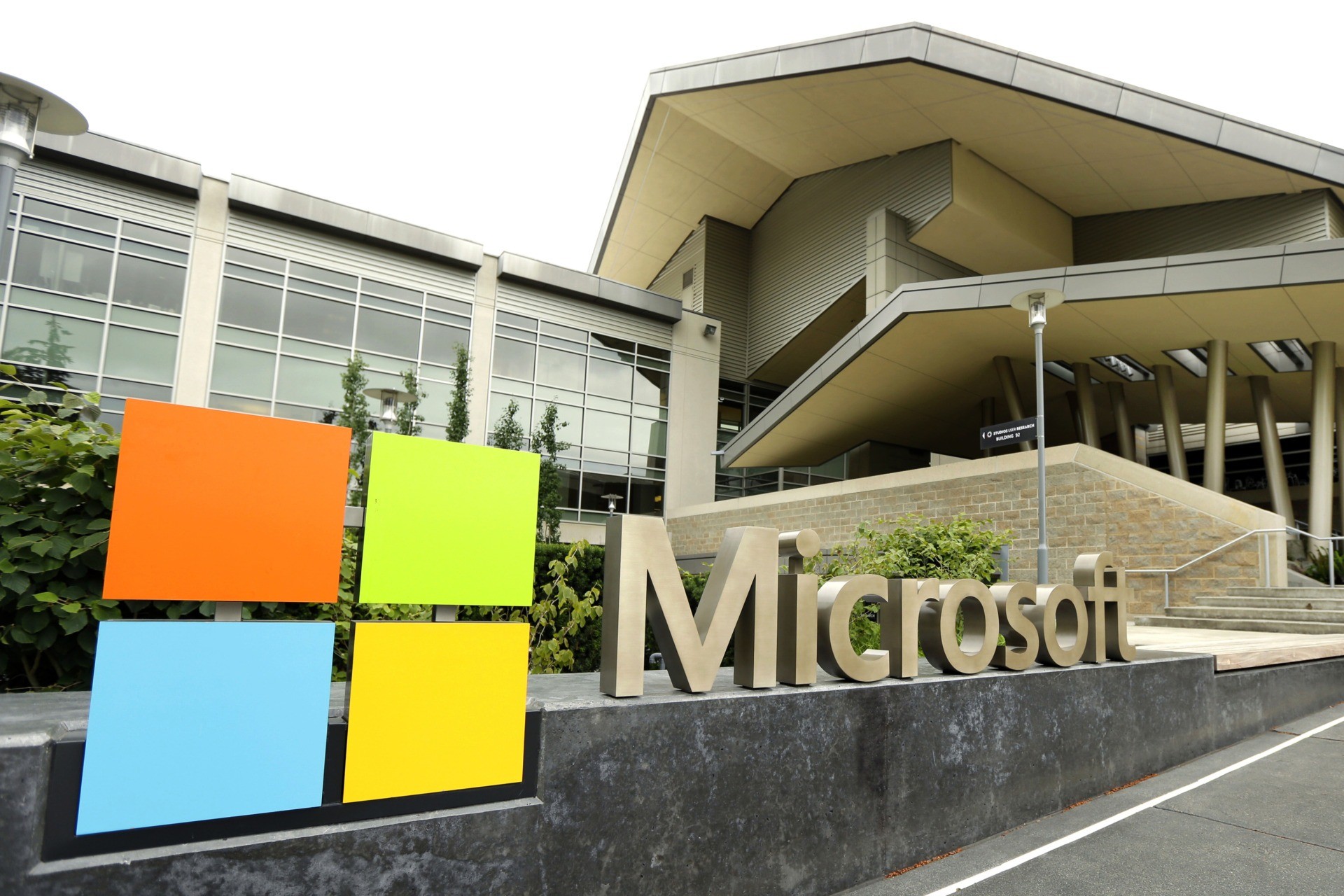
The Microsoft Visitor Center in Redmond, Washington, on July 3, 2014. (AP Photo/Ted S. Warren, File)
Indeed, Amazon announced several weeks later it was contesting the decision, citing alleged improper pressure from Trump. The lawsuit placed the contract on hold.
In July 2021, the Biden Pentagon announced it was canceling the contract and creating a new one, with Amazon back as a contender. The decision was described by the New York Times as a “victory for Amazon.”
DOD Chief Information Officer John Sherman said he expected both Microsoft and Amazon to get cloud contracts, according to the Guardian.
In November 2021, the Pentagon announced the successor to JEDI would be called the “Joint Warfighting Cloud Capability,” or JWCC.
Although Amazon, Microsoft, Google, and Oracle were invited to bid, the RFP stated: “The Government anticipates awarding two IDIQ contracts — one to Amazon Web Services, Inc. (AWS) and one to Microsoft Corporation (Microsoft) — but intends to award to all Cloud Service Providers (CSPs) that demonstrate the capability to meet DoD’s requirements.”
On Wednesday, December 7, 2022, the Pentagon announced that all four companies would be awarded under the new contract, which has a ceiling of $9 billion.
Donnelly Sets the Table for Amazon
Sally Donnelly was and still is a major player in the defense industry with many powerful connections on both sides of the aisle, having served at the Pentagon during the Bush, Obama, Trump, and now Biden administrations.
She was a TIME Magazine journalist for 20 years who first joined the DOD in 2007 as an assistant to the Chairman of the Joint Chiefs of Staff Adm. Mike Mullen. In 2010 she ran Central Command’s Washington office for Mattis when he was Centcom commander.
In 2012, she left the DOD and launched a consulting firm, SBD Advisors.
The firm would take on some high-profile clients — including Amazon. Donnelly would maintain her close ties to the Pentagon, helping to advise incoming Defense Secretary Ashton Carter in 2014.
Donnelly would re-join the Pentagon on January 21, 2017, with Mattis when Trump nominated him as defense secretary. Although Donnelly was known to be a “lefty” by other Trump administration officials, Trump had given Mattis a wide berth on who to bring on board. Donnelly even served as a member of the “beachhead” team, tasked with building up the new Trump administration’s Pentagon.
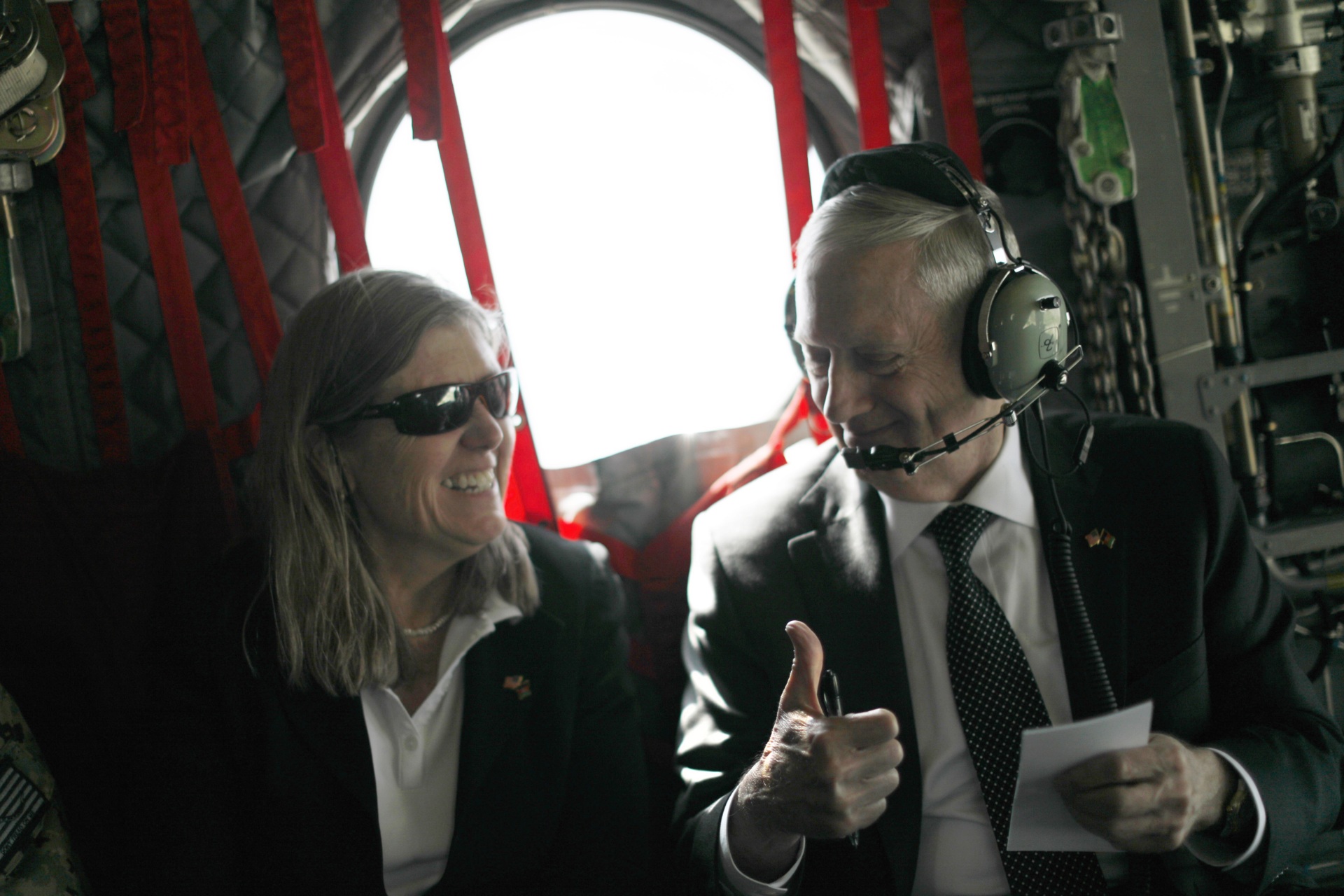
U.S. Defense Secretary James Mattis (right) gestures to senior advisor Sally Donnelly as they arrive by helicopter at Resolute Support headquarters in the Afghan capital Kabul on April 24, 2017. (JONATHAN ERNST/AFP via Getty Images)
Donnelly’s office was in the actual suite of the Office of the Secretary of Defense, not far from Mattis’s door — the pinnacle of power in the Pentagon.
Donnelly, as an incoming senior administration official, was required to submit her new entrant report, a financial disclosure form known as Office of Government Ethics Form 278e, where officials list all their sources of income over the past two calendar years in order to help government agencies identify and help officials avoid potential conflicts of interest or the appearance of conflicts of interest.
The form is required to be submitted within 30 days of starting employment. However, she would miss that deadline while she arranged meetings between DOD and individuals and entities she had covered relationships with, including Amazon and its employees.
Donnelly would not file her report until May 17, 2017.
Donnelly Organizes Private Dinner for Former Clients and Mattis
In March 2017, just two months after she rejoined the Pentagon, Donnelly arranged a private dinner for Mattis — according to his then-chief of staff Kevin Sweeney — at one of London’s most exclusive pubs during an official trip.
According to an official DOD itinerary obtained through FOIA litigation, the dinner was filled with Donnelly’s former clients. The formal “host” of the dinner was a former British general that both Donnelly and Mattis knew, but who was also a partner at C5 Capital Ltd., a private equity firm and a former client of Donnelly’s.

A general view of atmosphere at LouLou’s 5 Hertford Street on October 3, 2012, in London, England. (Chris Jackson/Getty Images for Pace London)
The itinerary showed that another dinner guest was Pienaar, the CEO of C5 Capital. As mentioned, C5 was not only a client of Donnelly’s former firm, but Pienaar also — along with Mai — created VMAP, the purchaser of SBD Advisors, two days before Donnelly entered the Pentagon in January 2017. VMAP would pay Donnelly four six-figure installments — one before she started working at the DOD and three while she served at the Pentagon.
At the time, Pienaar was dating Carlson, the Amazon executive, who was also at the dinner. At the time, Carlson was Amazon Web Services (AWS)’s vice president of worldwide public sector sales in charge of Amazon’s expected bid for the JEDI contract. During this dinner, Carlson pitched to Mattis a future meeting with Bezos.
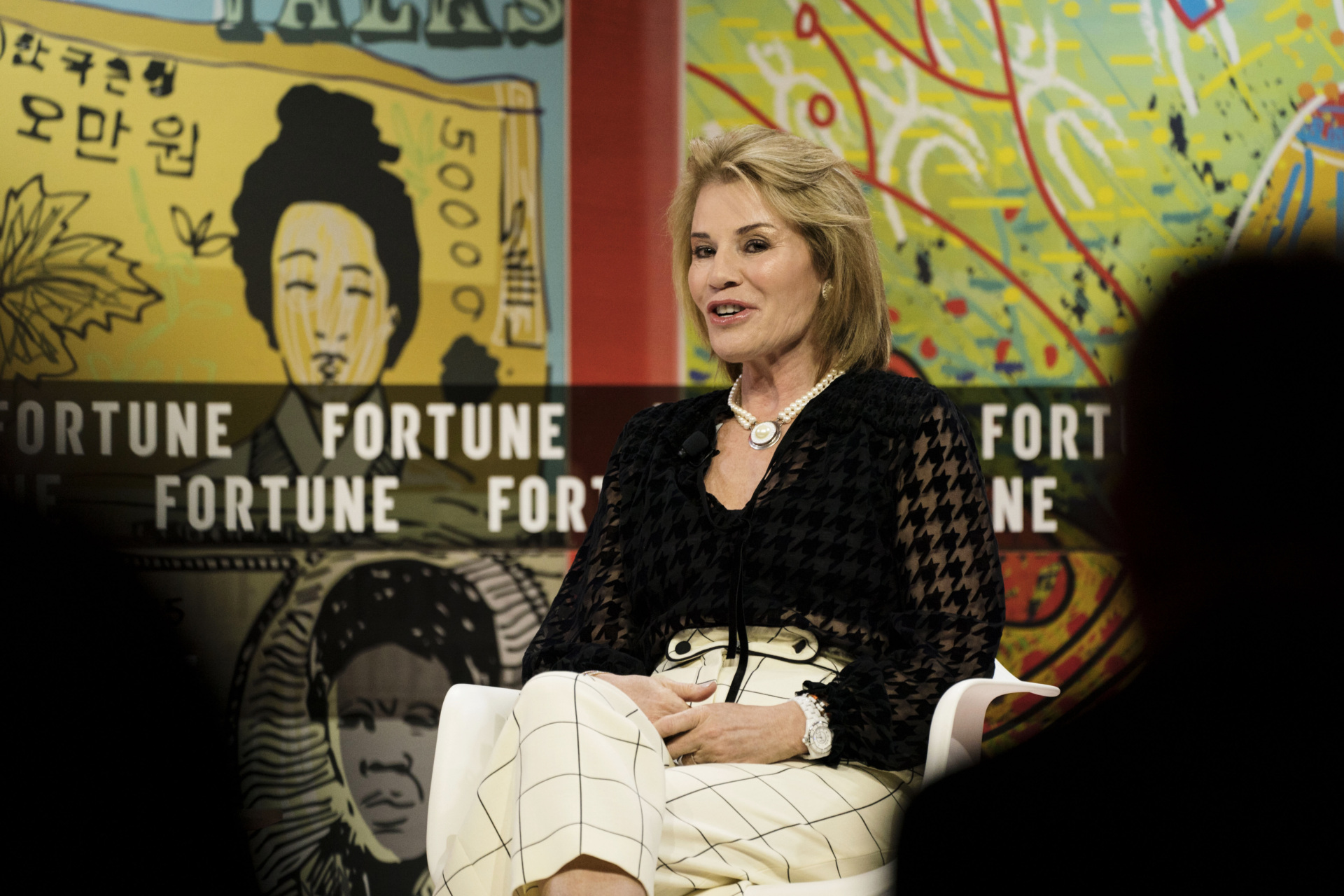
Teresa Carlson, vice president of the worldwide public sector at Amazon Web Services LLC, speaks during the Fortune’s Most Powerful Women Summit in Washington, DC, on Oct. 23, 2019. (Sarah Silbiger/Bloomberg via Getty Images)
The DOD, in response to a FOIA request, initially released an itinerary that had names redacted, including those of Carlson and Pienaar. After further request, the DOD produced an unredacted version, revealing Carlson and Pienaar’s names.
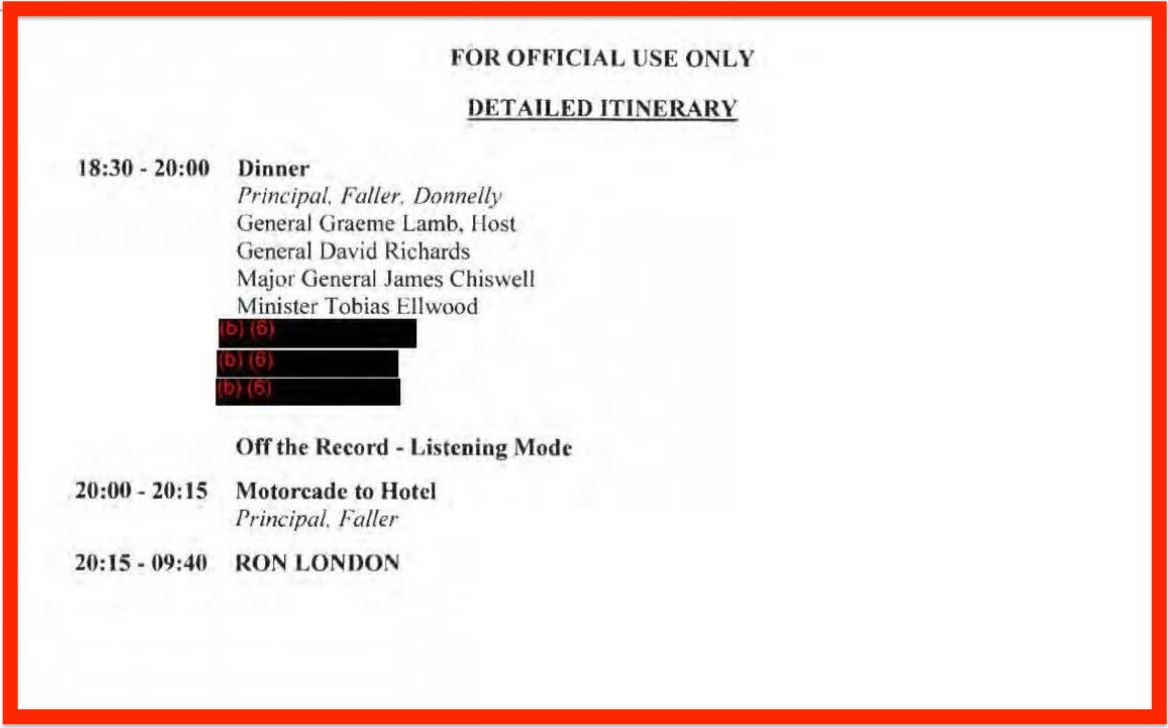
Official DOD itinerary with Carlson and Pienaar’s names redacted, March 23, 2017, obtained via FOIA.
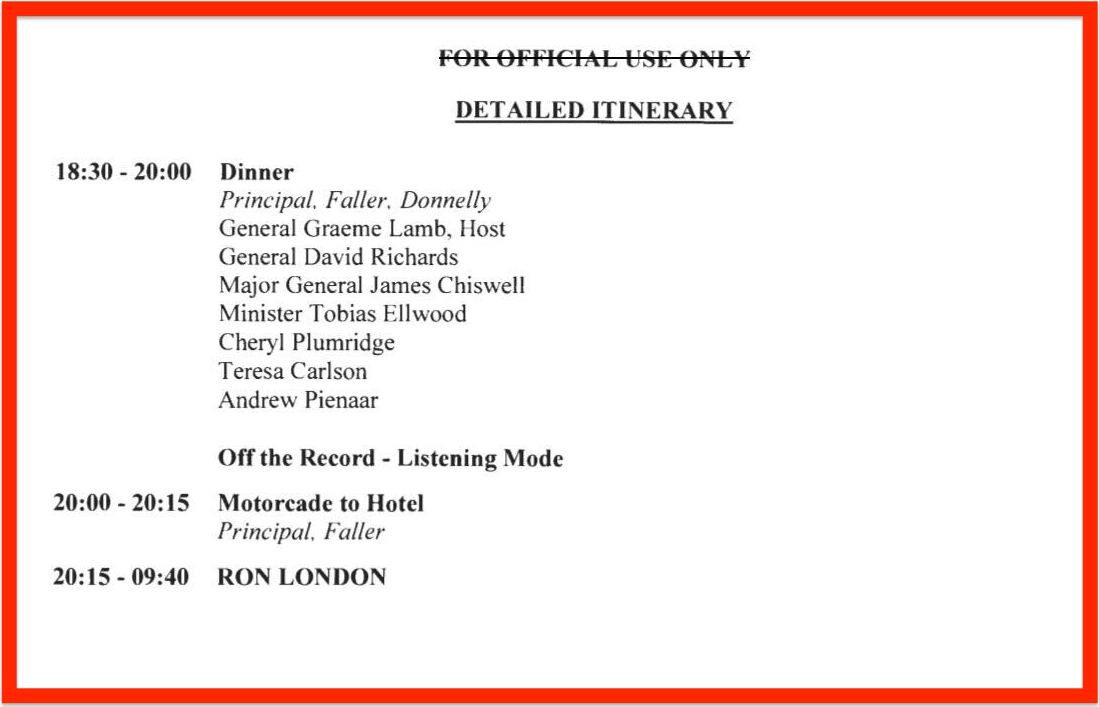
Official DOD itinerary with Carlson and Pienaar’s names revealed, March 23, 2017, obtained via FOIA.
Donnelly’s presence at this dinner may have violated federal ethics regulations. 5 C.F.R. § 2635.502(b)(1) prohibits officials from working on any matter involving individuals or entities she had a “covered relationship” with — which include any former client for at least a year, unless given express permission.
In Donnelly’s case, covered relationships would have included Amazon and C5 and their knowledgeable officers, employees, agents, contractors and consultants, for at least a year unless she had written permission from the DOD’s Standards of Conduct Office (SOCO).
The purpose of federal ethics regulations such as 5 C.F.R. § 2635.502 is not just to prevent actual wrongdoing, but to also prevent a situation where a “reasonable person” who knows the relevant facts would question an official’s impartiality in the situation.
According to this federal ethics regulation, Donnelly should have proactively reached out to SOCO to advise them of the dinner and then fill out an ethics approval request, which would include all the potential conflicts of interest involving her relationships to Pienaar and Carlson and her prior work for C5 and AWS.
Rep. Ken Buck (R-CO) and Sen. Mike Lee (R-UT) sent a letter in 2021 calling for the Justice Department to look into the matter, claiming potential violations of federal criminal laws and a potential violation of the Sherman Act by Amazon. They wrote:
In addition to obvious procurement integrity issues, there appear to be multiple potential violations of Federal criminal laws that have yet to be investigated in any meaningful way, including potential violations of 18 U.S.C. §§ 203, 205, and 208 (criminal conflicts of interest); 18 U.S.C. § 201(b)(1) (bribery of a public official); and 18 U.S.C. § 201(b)(2) (acceptance of a bribe by a public official). There also appear to be potential violations of Section 2 of the Sherman Act, 15 U.S.C. § 2, as Amazon, through its conduct, may have attempted and/or conspired to monopolize one or more markets within the cloud services space.
In fact, a deputy that Donnelly brought with her to the Pentagon from her firm who worked on the Amazon Web Services account, retired Lt. Col. Anthony DeMartino, had submitted his new entrant report on April 18, 2017, and SOCO directed him to consult them before participating in any matters involving AWS, according to an official SOCO email shown below.

DOD Standards of Conduct Office email to Retired Lt. Col. Anthony DeMartino, April 24, 2017, obtained through FOIA.
Yet, DeMartino, like Donnelly, was still apparently involved with the JEDI program, and wanted to remain “linked into” the Cloud Executive Steering Group (CESG), which was tasked with devising and overseeing the adoption of cloud architectures and cloud services, “focusing on commercial solutions.”
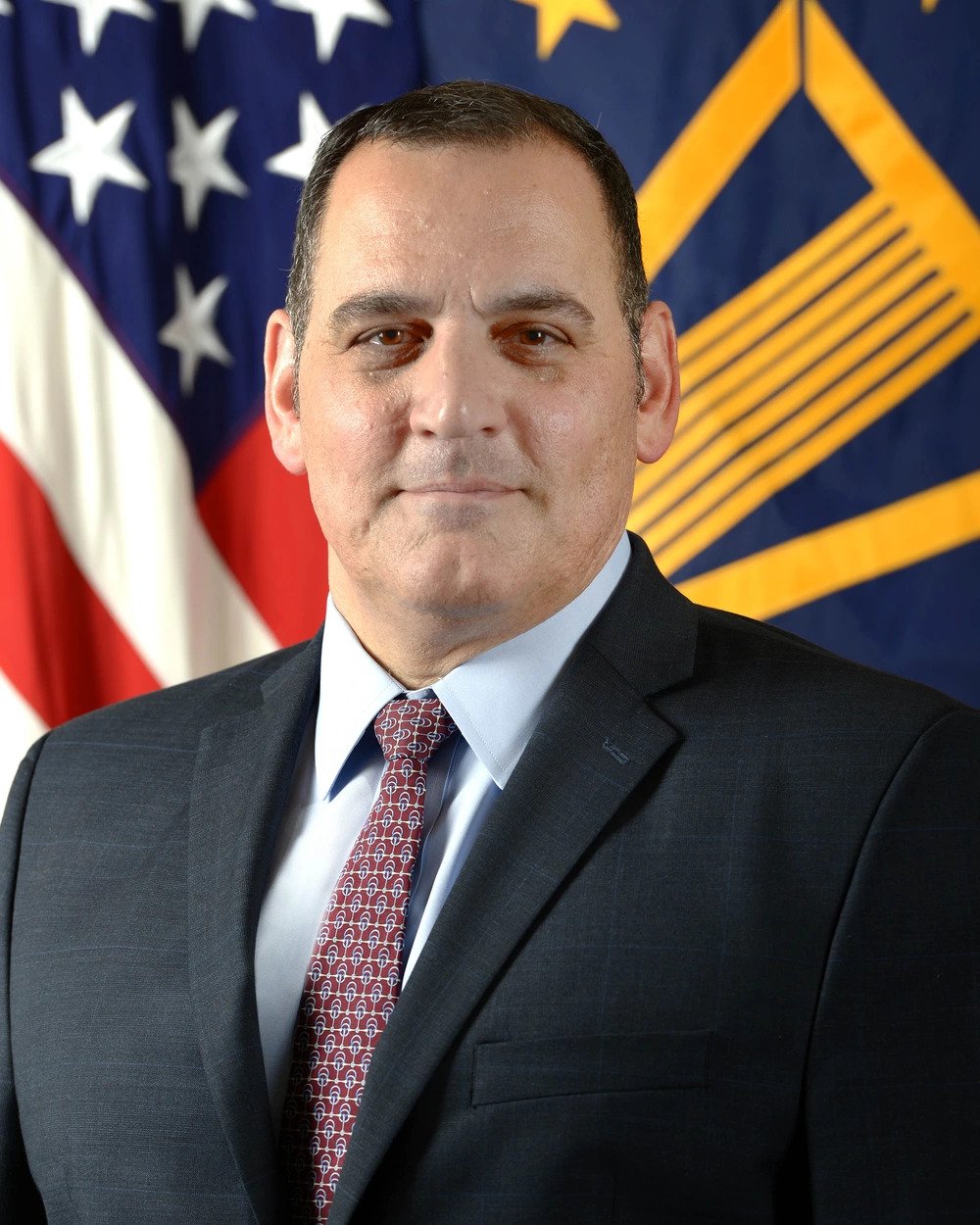
Anthony “Tony” D. DeMartino, Deputy Chief of Staff to the Secretary of Defense, poses for his official portrait at the Pentagon in Arlington, Virginia, on May 11, 2017. (U.S. Army photo/Monica King)
DeMartino also appeared to keep Donnelly in the loop by forwarding her emails related to the cloud initiative, according to official DOD emails obtained through FOIA. He also did not seek a waiver from SOCO related to Amazon matters, according to the December 2018 Bloomberg article.
Without seeking an ethics approval and with her new entrant report still not yet filed, Donnelly next approved a call between Mattis and Bezos.
Donnelly Approves Call between Mattis and Bezos: “Why Not?”
Three weeks later, on April 27, 2017, a colonel whose name is redacted sent an email to Donnelly and Mattis’s senior military assistant Navy Rear Adm. Craig Faller, asking them for approval for a call between Bezos and Mattis.
Donnelly green-lighted the call, writing, “I think he is the genius of our age, so why not?”
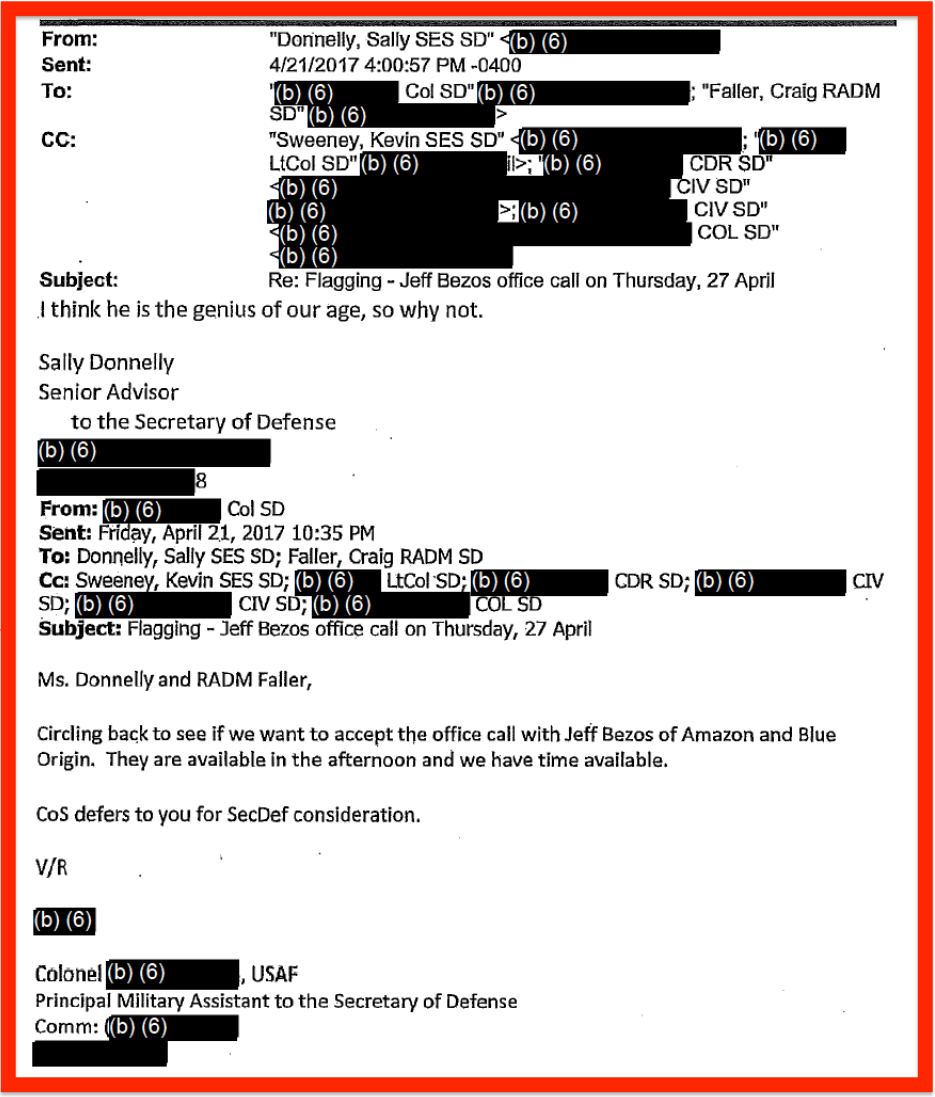
Official email from Sally Donnelly to Navy Rear Adm. Craig Faller, Mattis’s senior military assistant, approving a call with Jeff Bezos, April 27, 2017, obtained through FOIA.
Donnelly then went further, sending Faller an email with the subject line: “Why Bezos.” The email contained seven bullet points praising Amazon and Bezos. One bullet point explicitly mentions Carlson asking during the private dinner: “He asked (via Theresa Carlson at the dinner in London).”
Another bullet point mentions Amazon’s cloud services specifically, noting the CIA is pleased with those services: “Amazon’s success based on technical excellence and security. The Amazon cloud is the foundation of all Amazon’s businesses and allows unprecedented speed. … By all accounts, the CIA remains pleased with its work.”
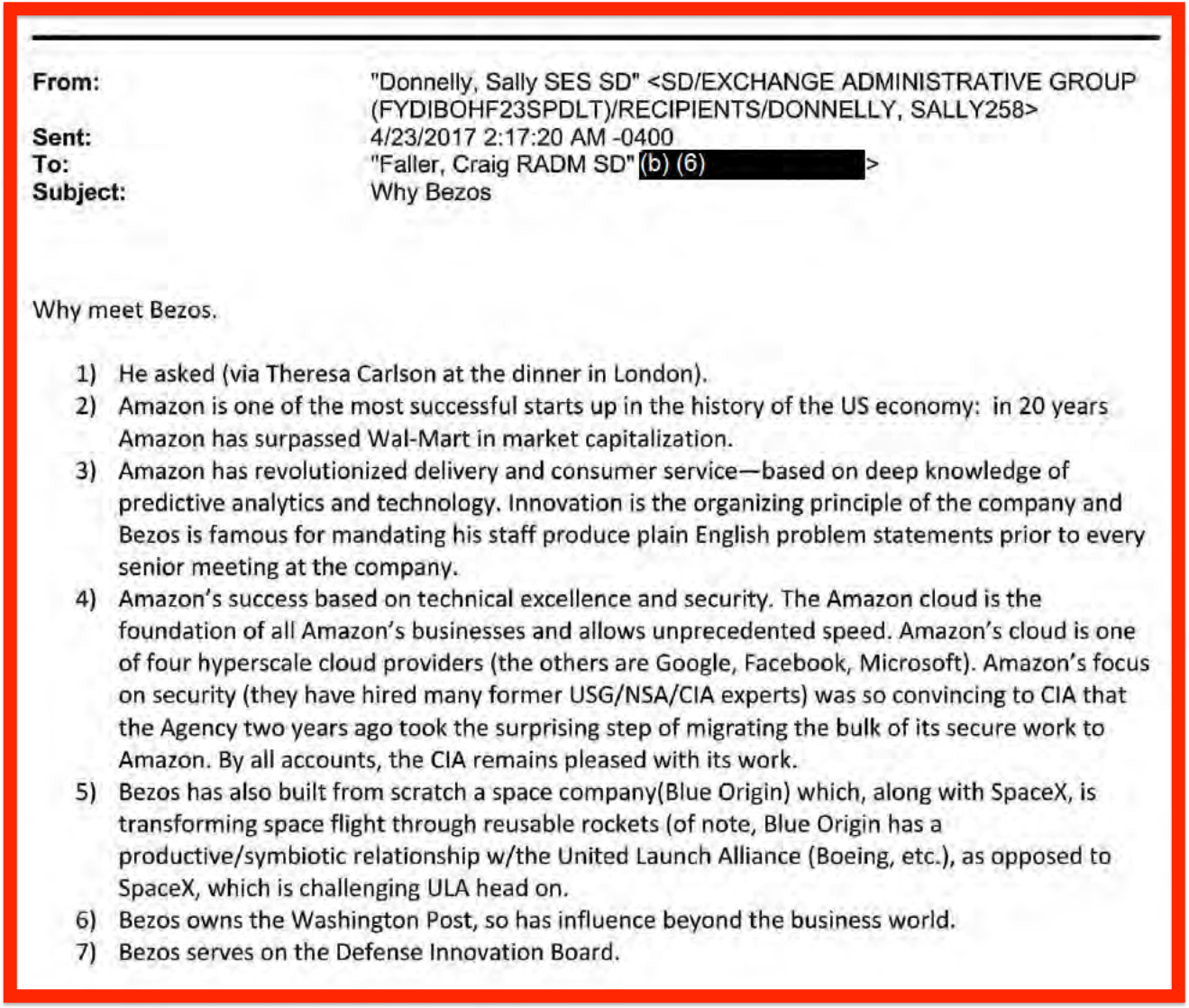
Official email from Donnelly to Faller with bullet points on why Mattis should speak to Bezos, April 23, 2017, obtained via FOIA.
The email also mentions Amazon’s space rocket manufacturing company Blue Origin, another company owned by Bezos — and one of Donnelly’s future clients at her new consulting company.
About three weeks after Donnelly approved the call, she would finally file her new entrant report on May 17, 2017, according to the date on the report.
Still, Donnelly’s involvement with Amazon matters did not end there.
Donnelly Suggests Mattis Visit Amazon’s Headquarters
In August 2017, about three months after she approved the Mattis-Bezos call, Donnelly suggested to Mattis that he take a trip to visit technology CEOs on the West Coast to better understand cloud capacity and data security, according to the Pentagon inspector general’s report.
Donnelly helped with preparations for Mattis’s meeting at Amazon, making edits to and approving a meeting agenda that included discussion on cloud technology, according to the new evidence.
A defense official whose name is redacted emailed Donnelly, writing, “Sorry to ambush you, but wanted to run the revised Amazon framework by you. This reflects the edits you made earlier today. If this looks ok with you, I can shoot it off to Iram.”
Iram A. Ali was a former DOD official who joined Amazon at the end of the Obama administration.
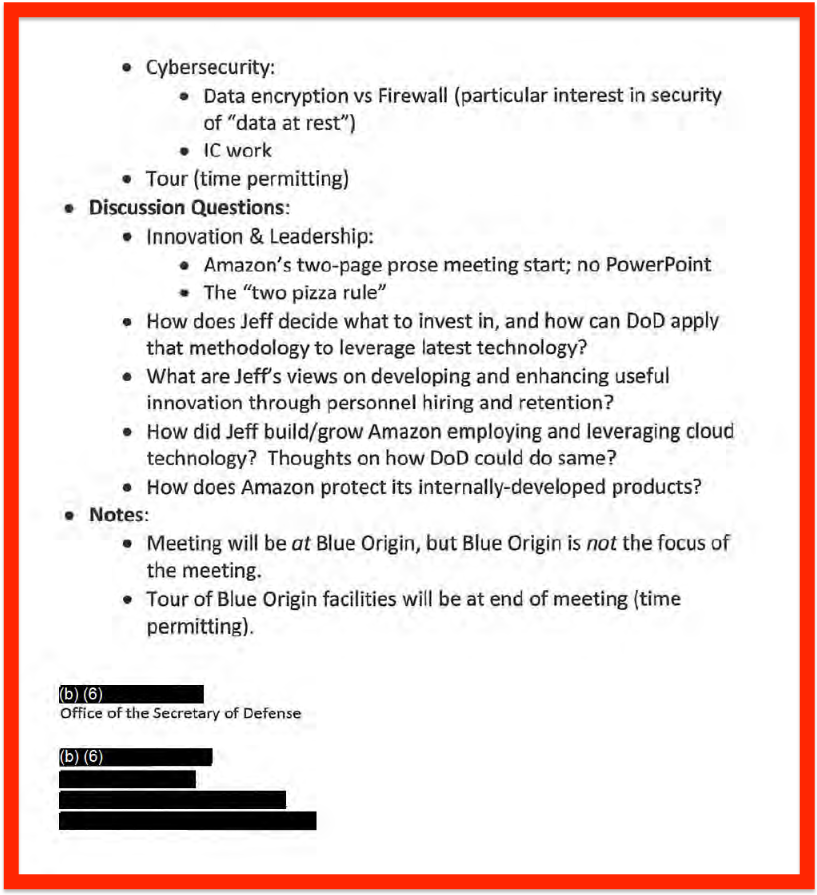
Official emails from Donnelly to DOD officials signing off on an agenda for Mattis’s meeting at Amazon that included discussion of cloud technology, July 12, 2017, obtained via FOIA.
Donnelly also appears to have coached another Amazon employee, Jennifer Chronis, on how to talk to Mattis.
Chronis wrote to Donnelly before the Amazon meeting, “I miss working with you,” and asked her for advice on what to avoid during Mattis’s visit and on how to get around “challenges” and “major policy blockers” at the Pentagon.
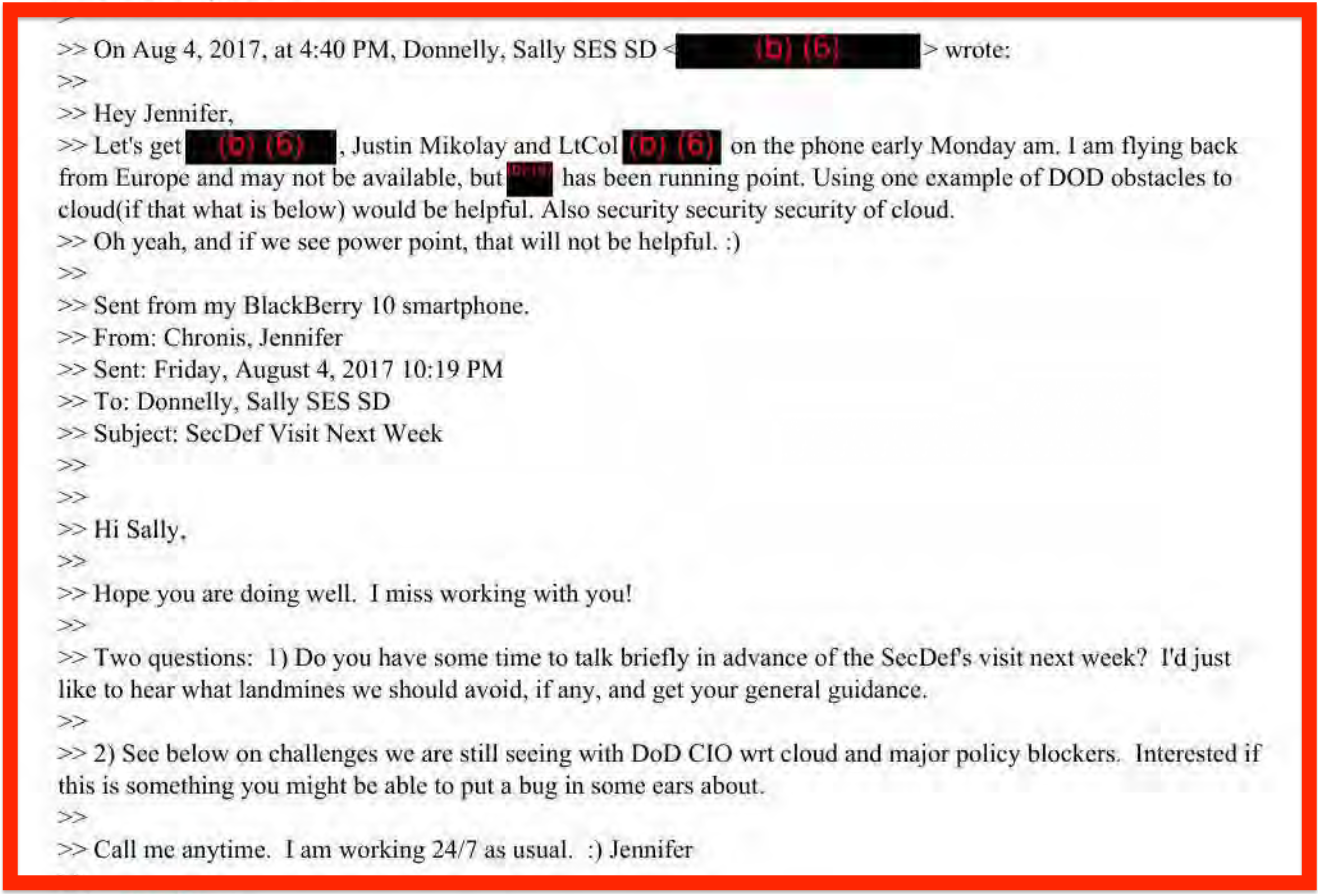
Email from Amazon employee Jennifer Chronis to Donnelly saying, “I miss working with you,” and asking for her advice on how to approach Mattis, August 4, 2017, obtained via FOIA.
The tentative agenda of the meeting showed that Chronis was assigned to give Mattis a “cloud overview,” and that Carlson was assigned to give Mattis a “welcome and overview.” (The final agenda was more vague, saying that Chronis would brief Mattis on “AWS in the Department of Defense,” and Carlson would give Mattis a “Welcome & Kickoff.”)
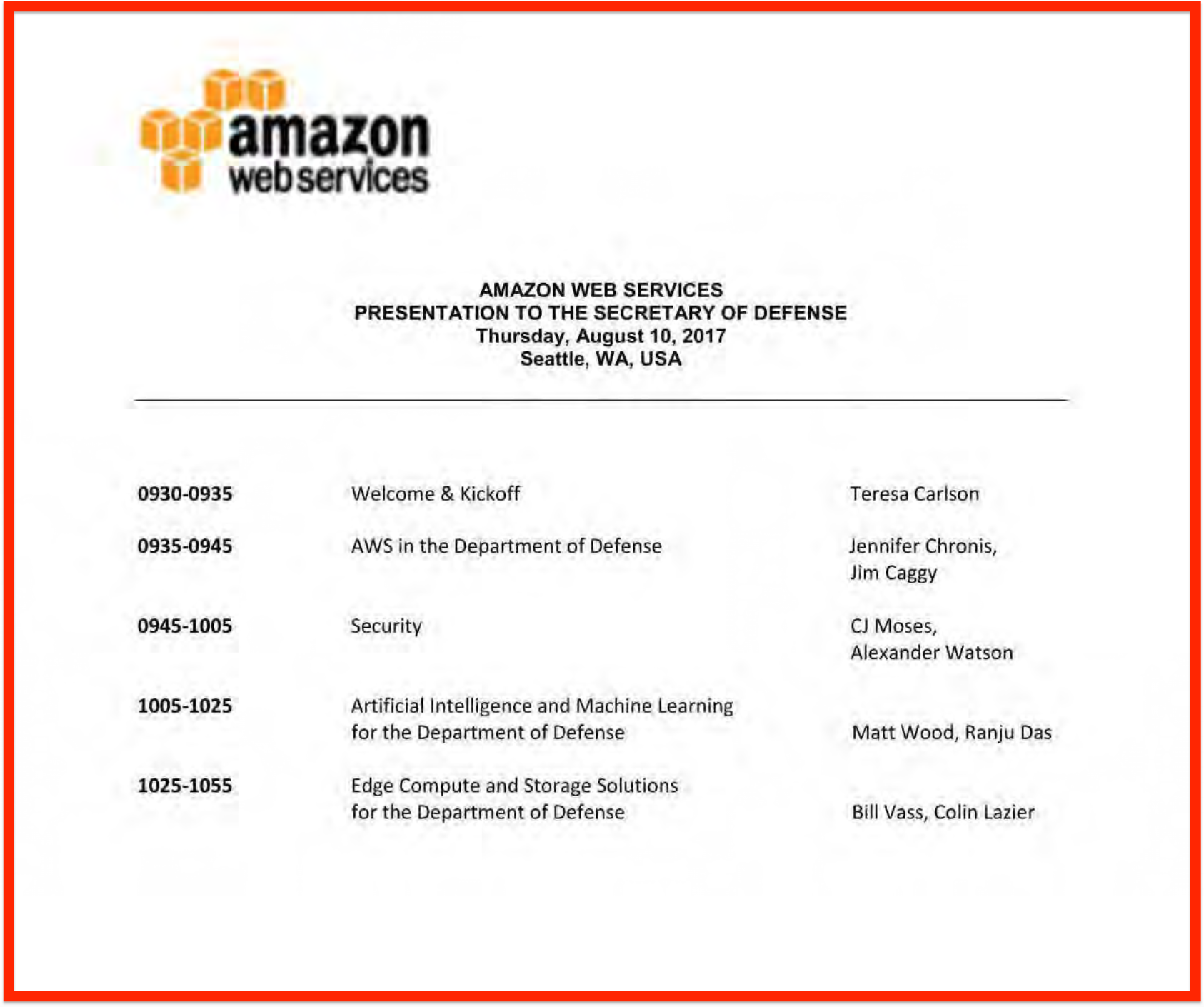
Final agenda for Mattis’s trip to Amazon’s headquarters showing that Donnelly’s former business colleagues Carlson and Chronis are scheduled to welcome Mattis and brief him on “AWS in the Department of Defense” respectively, undated, obtained via FOIA.
Although Mattis was scheduled to meet with Bezos for 30 minutes only, Bezos ended up staying the entire three-hour meeting with Mattis — much longer than the time he spent with other tech company executives, such as Apple CEO Tim Cook.
A pleasure to host #SecDef James Mattis at Amazon HQ in Seattle today pic.twitter.com/JnQZoSOnFN
— Jeff Bezos (@JeffBezos) August 10, 2017
Donnelly herself was not on the trip, but a DOD official at the Bezos meeting whose identity was redacted reported back to Donnelly that the meeting “seemed to morph into an AWS sales pitch.”
Mattis is “99.9% there” in terms of going to cloud, the official added.
“Excellent,” Donnelly responded.
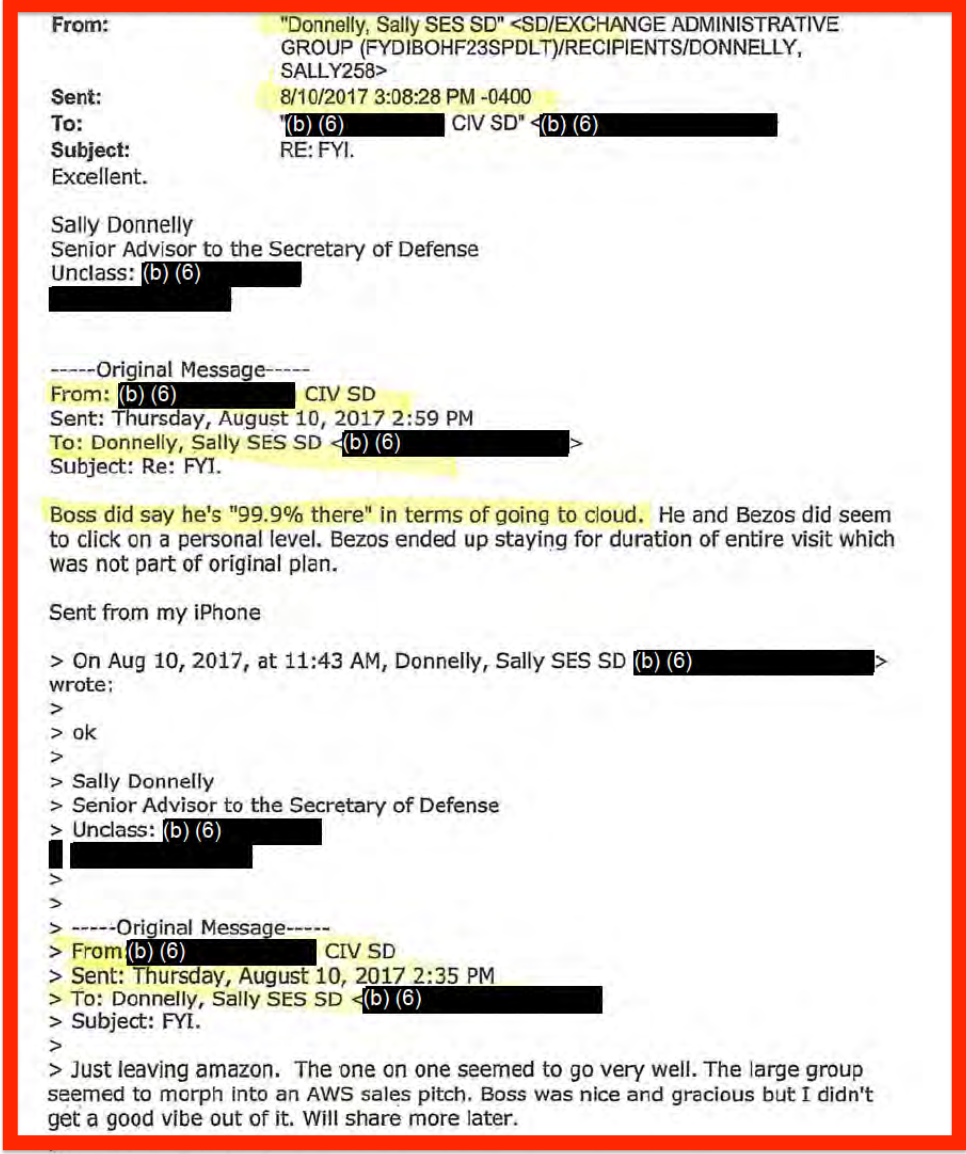
Official email from a DOD official to Donnelly telling her that the Amazon meeting turned into an “AWS sales pitch,” and that Mattis was “99.9% there in terms of going to the cloud,” to which Donnelly responded, “Excellent,” August 10, 2017, obtained via FOIA.
The original agenda for Mattis’s Amazon meeting showed that it was to be held at Blue Origin. The agenda said, “Meeting will be at Blue Origin, but Blue Origin is not the focus of the meeting.”
Two days after the meeting, Will Roper, then-director of the Pentagon’s Strategic Capabilities Office who accompanied Mattis on the trip, sent a summary of the trip to the new Deputy Secretary of Defense Patrick Shanahan and Ellen Lord, the top DOD acquisitions official, with: “[Secretary of Defense] now believes in cloud tech and wants to move the Department to it; we have the baton on pulling together a plan for him.”
Roper added, “Overall, great trip with an important decision: this is long overdue!”
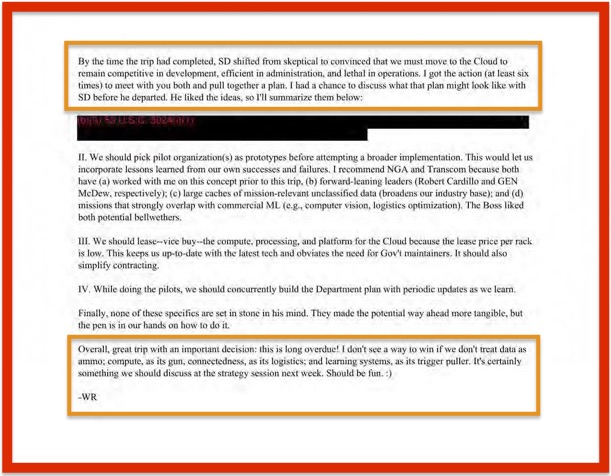
Official email from DOD official Will Roper briefing Deputy Defense Secretary Patrick Shanahan and DOD official Ellen Lord that Mattis “now believes in cloud tech.” DeMartino forwards it to Donnelly, who responds “Beaut. Tnx,” August 12, 2017, obtained via FOIA. (Emphasis added to portions of the email highlighted in orange).
Meanwhile, DeMartino — who was supposed to recuse himself from matters related to Amazon — would continue forwarding emails to Donnelly on cloud-related developments.
DeMartino, who was then-chief of staff for Shanahan, forwarded her one email that said “situational awareness. No [distribution] please.” Donnelly replied to DeMartino, “Beaut. Tnx.”
Donnelly Works to “Crush the Bureaucratic Impediments”
Donnelly also may have helped to get an ally a key position in implementing the JEDI contract.
Chris Lynch — the head of the Digital Defense Service, an initiative at the DOD created by the Obama White House that recruited tech experts from the private sector — emailed Donnelly on August 24, 2017, asking for permission to lead the cloud “Tiger Team.” He emailed Donnelly that he would swing by. “Do it quick,” she responded.
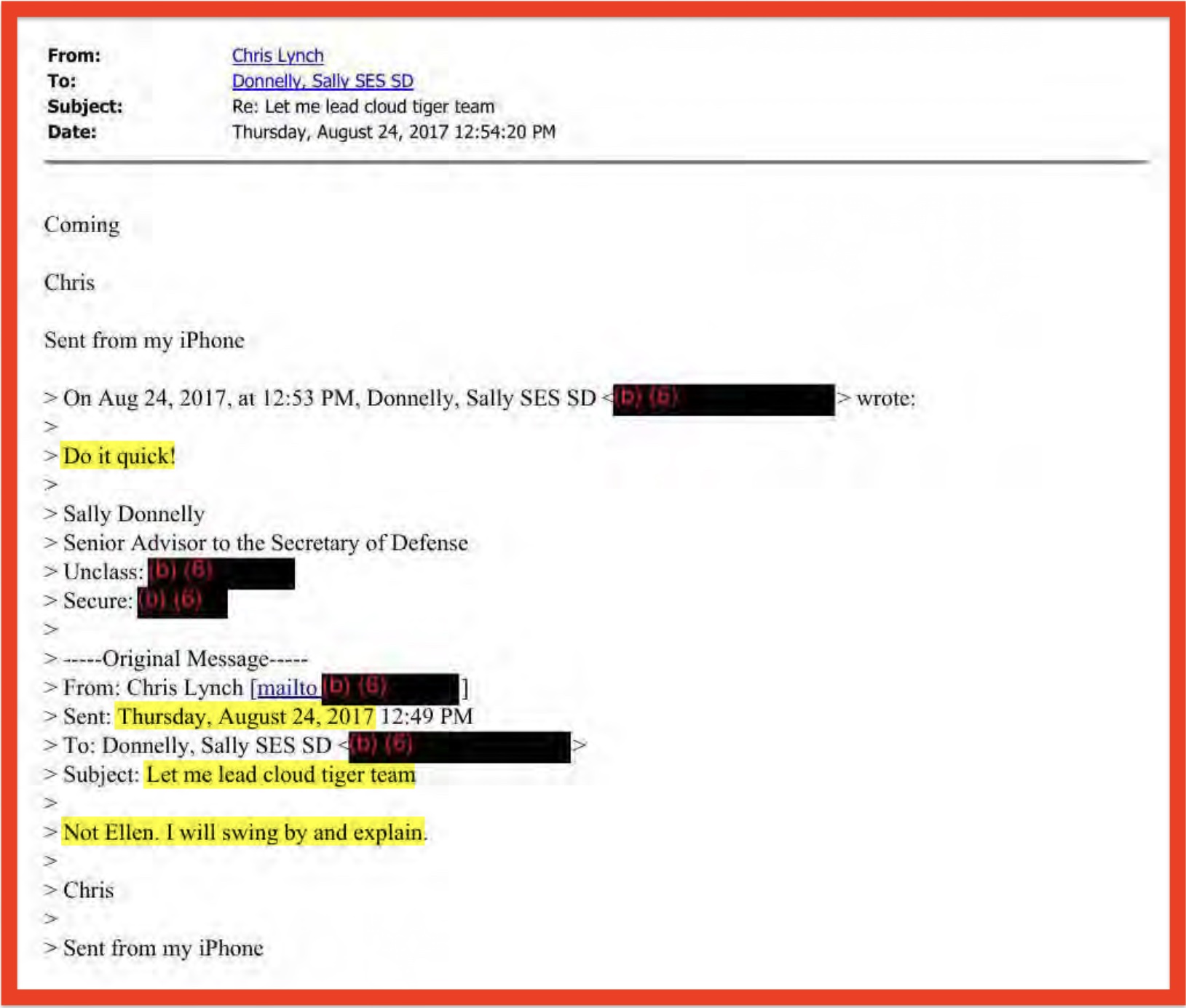
Official DOD email from then-DDS Director Chris Lynch to Donnelly with subject line: “Let me lead cloud tiger team,” which was in charge of implementing phase one of the cloud services contract, dated August 24, 2017.
About three weeks later, Lynch would be put in charge of leading phase one of the JEDI contract, according to the September 17, 2017, memo from Shanahan.
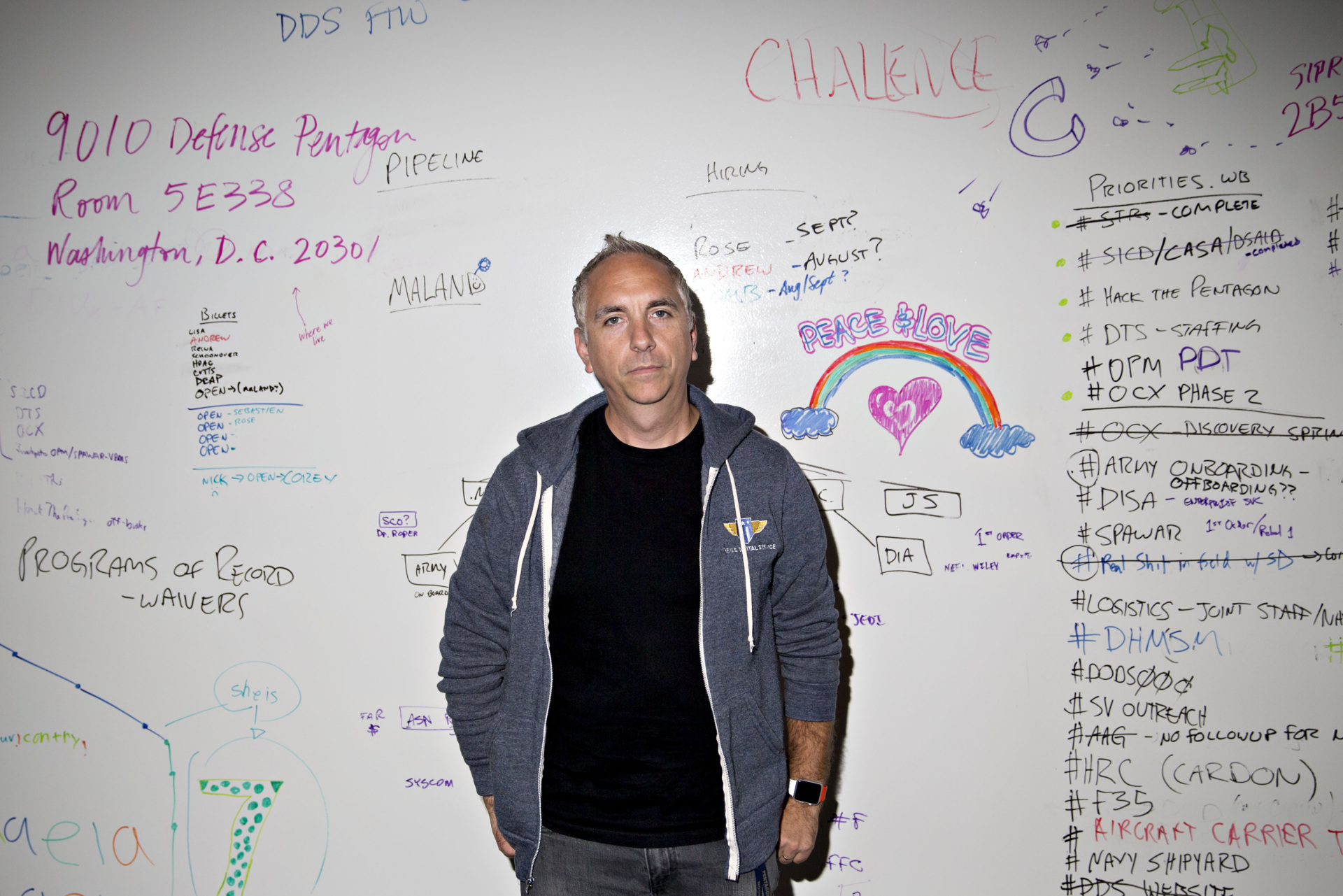
Chris Lynch, director of the U.S. Defense Department’s Defense Digital Service, stands for a photograph in his office at the Pentagon in Washington, DC, on Aug. 23, 2016. (Andrew Harrer/Bloomberg via Getty Images)
Donnelly also worked to “crush the bureaucratic impediments” to the JEDI contract, according to the new evidence.
Enrique Oti, then-managing director for Air Force Element at the DOD’s Defense Innovation Unit (DIU) wrote to Raj Shah, then-managing partner of the DIU, an email on August 25, 2017 — before the contract was announced — that said:
Raj, I just got off the phone with the AWS team putting together the Secret-level AWS cloud. It should go live in November. I’m very excited about that. They said that they had a great meeting with SECDEF, but their talks last week with DoD/CIO and DISA were ‘interesting.’ …
This is obviously a showstopper for the entire DoD. The second issue will be contracting. AWS does not know exactly who will take lead in DoD to establish a contract (I think it should be us), but they are trying to prove to DoD/CIO that this is enough demand in the DoD to warrant a contract. The AWS team thinks that 25th AF may be tasked to do this, but not until next Spring/Summer.
Shah then forwarded Oti’s email to DoD official Justin Mikolay, with Donnelly cc’ed, asking that a defense secretary memo “crush the bureaucratic impediments.”
Mikolay responded to Shah (emphasis added):
Amen. This is a great note from Enrique. Sally is already working angles with this note providing but targeting data (who to crush) and ammunition (reason to crush)….
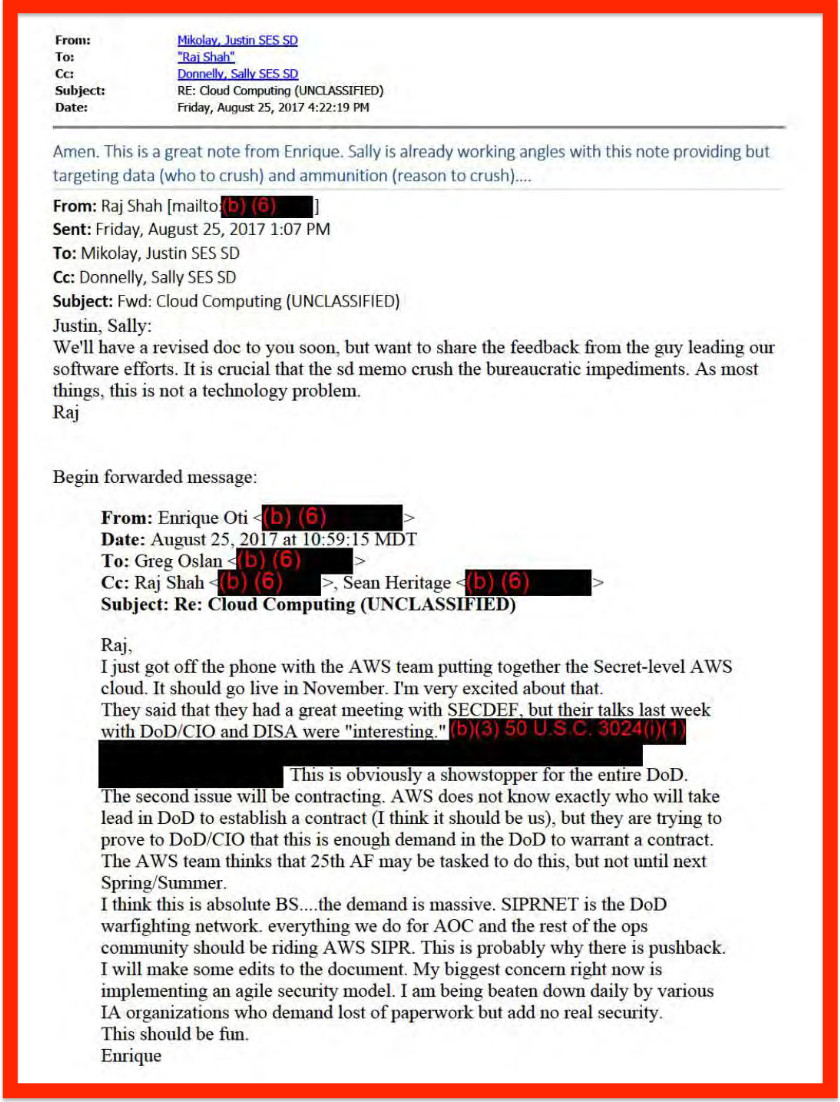
Official DOD emails discuss “bureaucratic impediments” to crush and Donnelly “already working angles” on “who to crush” and “reason to crush,” August 25, 2017, obtained via FOIA.
About a week before Mikolay’s email about Donnelly “working angles,” DeMartino had sent an email titled “Cloud Update” to several senior defense officials with Donnelly cc’ed. He wrote to Deputy Under Secretary of Defense for Intelligence and Security Kari Bingen, Director of Cost Assessment and Program Evaluation Bob Daigle, and Under Secretary of Defense for Acquisition and Sustainment Ellen Lord:
Kari/Bob, both of you have talked to me about Cloud and the desire to see progress on your independent initiatives. As a result, I am looping you into this discussion with Ellen and John Z. I’ve asked [redacted] and team to capture all the on-going efforts and provide a consolidated list of these activities for the Deputy.
He will be happy to hear that CIO is looking for ways to move forward.
Thanks,
Tony
Donnelly replied privately to DeMartino, “Awesome, thanks,” and noted she would connect with Lord. She also cast doubt on a separate cloud initiative. “The entire idea of ‘milcloud’ is questionable,” she said.
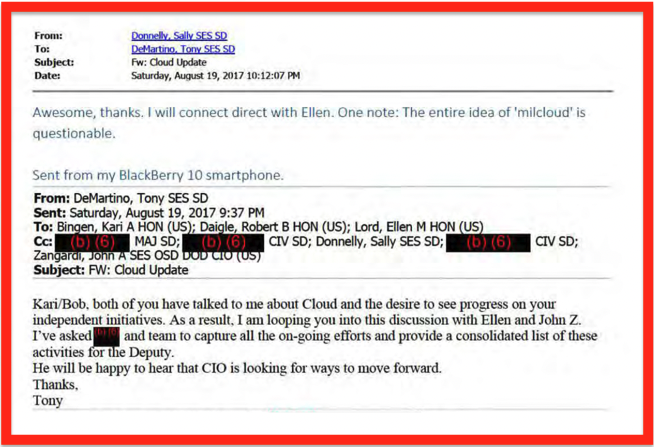
Official email from Donnelly to DeMartino casting doubt on a different cloud initiative, August 19, 2017, obtained via FOIA.
DeMartino also wrote an August 25, 2017, email to Roper and Lynch, with Donnelly cc’ed, saying: “Chris/Will, can you two read through this memo – provide comments in track changes or a separate email and send back to us and Sally as we all work Cloud for DOD. Thanks, Tony.”
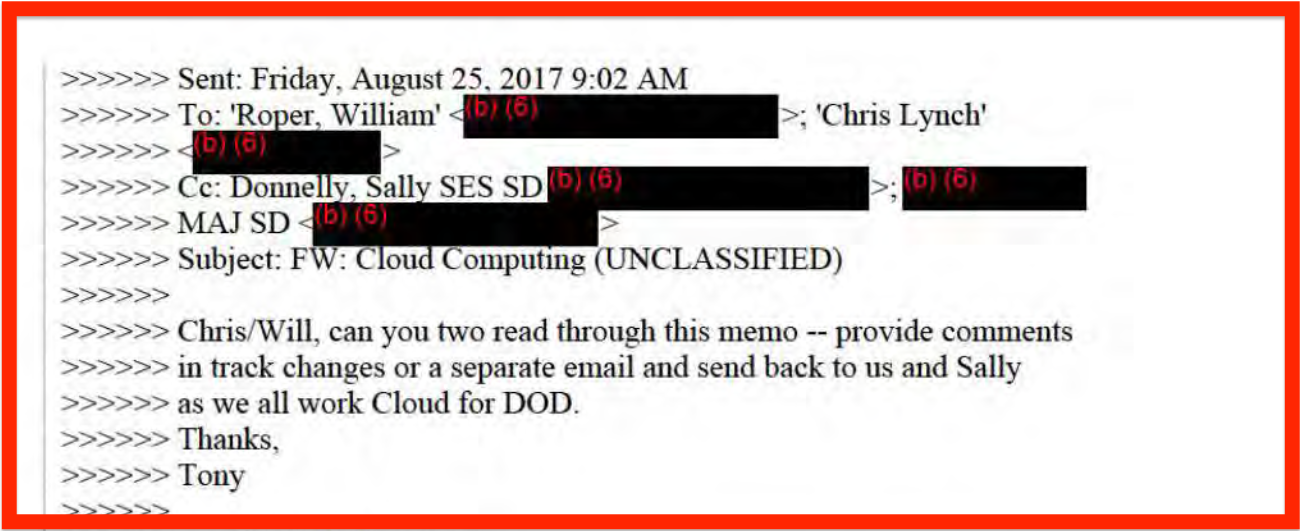
Official email from DeMartino to Roper with Donnelly cc’ed saying “as we all work Cloud for DOD,” August 25, 2017, obtained via FOIA.
Roper was a Donnelly ally and physicist who began serving at the Pentagon under the Obama administration. Roper had accompanied Mattis on the trip to the West Coast, and would serve on the Cloud Executive Steering Group. (He would stay at the Pentagon until the end of the Trump administration, serving as assistant secretary of the Air Force for acquisition, technology and logistics, and would join Donnelly’s new firm, Pallas Advisers).
Around this time, Joshua Marcuse, another DOD official who worked in the Obama administration, had begun working with Amazon on cost estimates for a move to the cloud — before the cloud initiative was officially announced, according to an official email on September 6, 2017.
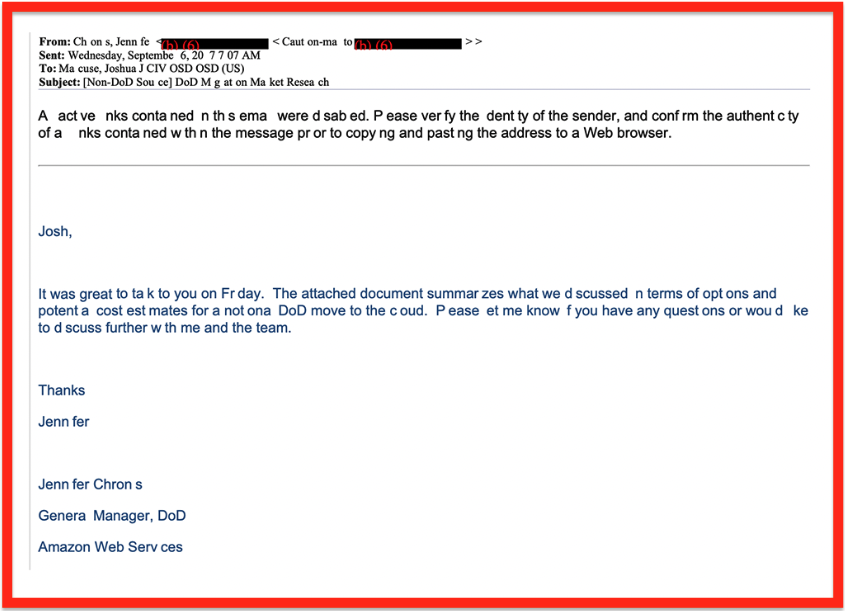
Email from Chronis to DOD official Joshua Marcuse referencing their discussion on “potential cost estimates for a notional DoD move to the cloud” before the cloud initiative was announced, September 6, 2017, obtained via FOIA.
Pentagon Memo Shows Plan for No-Bid Contract, Favoring Amazon
A week later, on September 13, 2017, Shanahan, the deputy secretary of defense, released the official memo establishing the cloud initiative.
The memo noted it would use a “tailored acquisition process” to acquire a cloud services solution. It also put Lynch in charge of leading phase one of the initiative — as he had requested from Donnelly. It said:
During Phase One, the DOD will use a tailored acquisition process to acquire a modern enterprise cloud services solution that can support unclassified, secret, and top secret information. This cloud services contract will also include, at a minimum, in-depth technical analysis of the current environment, the necessary cloud migration support, change management, and training. I am tasking the Director of DDS to lead phase one.
DOD’s JEDI Contracting officer Chanda Brooks would later testify that the memo came out prematurely. “Nobody planned for this memo to come out, and for us to hit the ground running during the fourth quarter of 2017,” she said.
When Lynch departed the Pentagon in April 2019, an article called his office “instrumental in the JEDI cloud competition.”
The Air Force would then use Shanahan’s memo as authorization for going with AWS without competition in a justification and approval (J&A) memo, which stated:
3. The AWS Cloud Solution is a DoD priority as per the Secretary of Defense Memorandum dated 13 Sep 2017, OSD011070-17 FOD. Air Force IT personnel are being trained on this solution. The mission of the CIE, in part, is to emulate the Air Force Cloud environment to ensure compatibility of development software with the standard infrastructure.
4. Therefore, at this time, the Government’s minimum needs can only be satisfied by the Smartronix AWS Cloud Solution.
A month later, Amazon’s Chronis reached out to Donnelly and Carlson, saying she wanted to pitch to Special Operations Command.
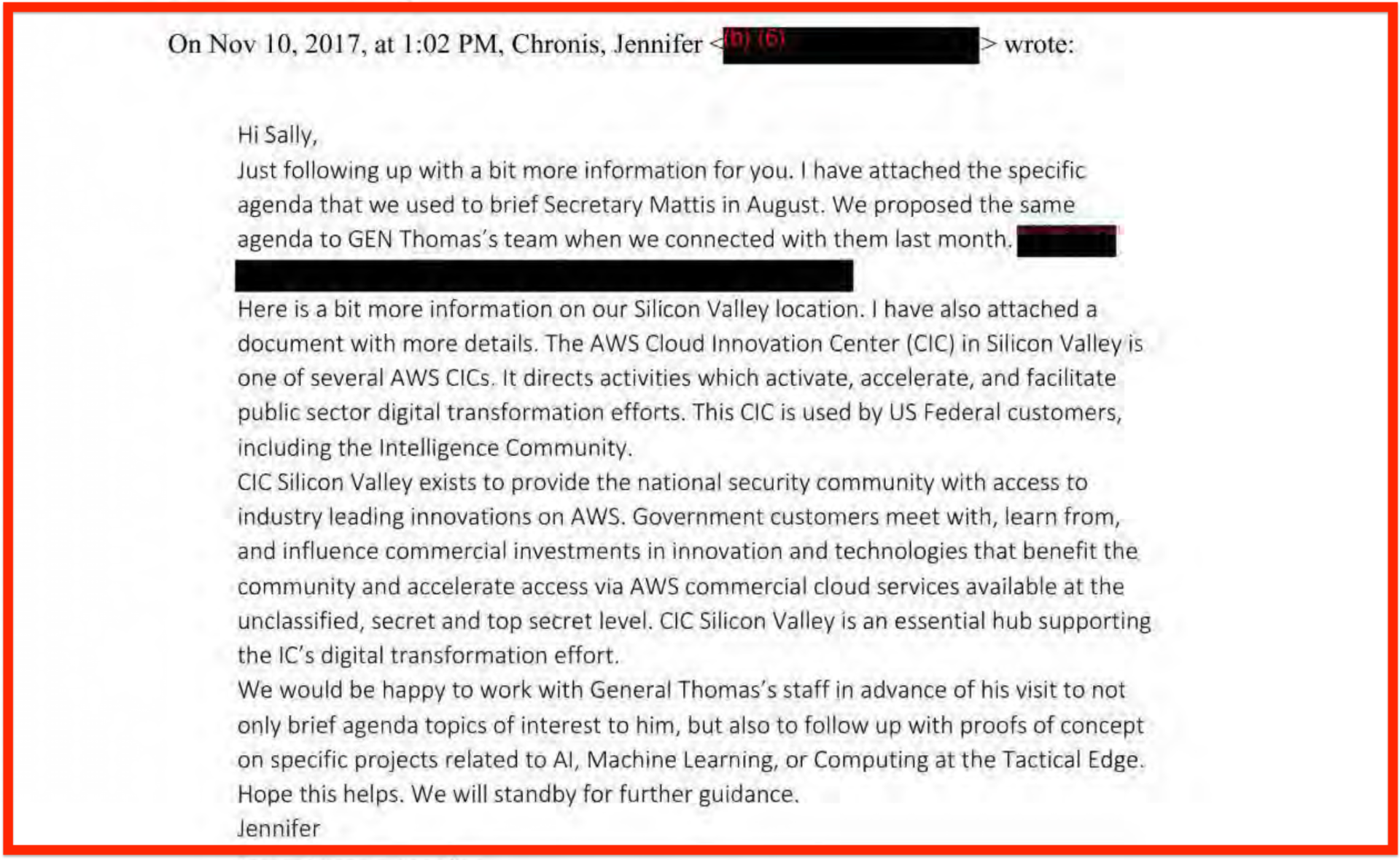
Email from Amazon’s Chronis reaching out to Donnelly and Carlson saying she wanted to pitch Amazon to Special Operations Command next, November 10, 2017, obtained via FOIA.
Donnelly Arranges Dinner for Mattis, Bezos, and Carlson
Donnelly would next facilitate dinner for Mattis, Bezos, and Carlson on January 17, 2018. The dinner, first reported by ProPublica, would take place “just as the DOD was finalizing draft bid specifications for JEDI.”
In an email from Donnelly to DOD officials about the dinner, Bezos is called “guest” and not by his name.
Right before the Bezos-Mattis dinner, Carlson sent Donnelly a factsheet on AWS that contained with information about cloud services.
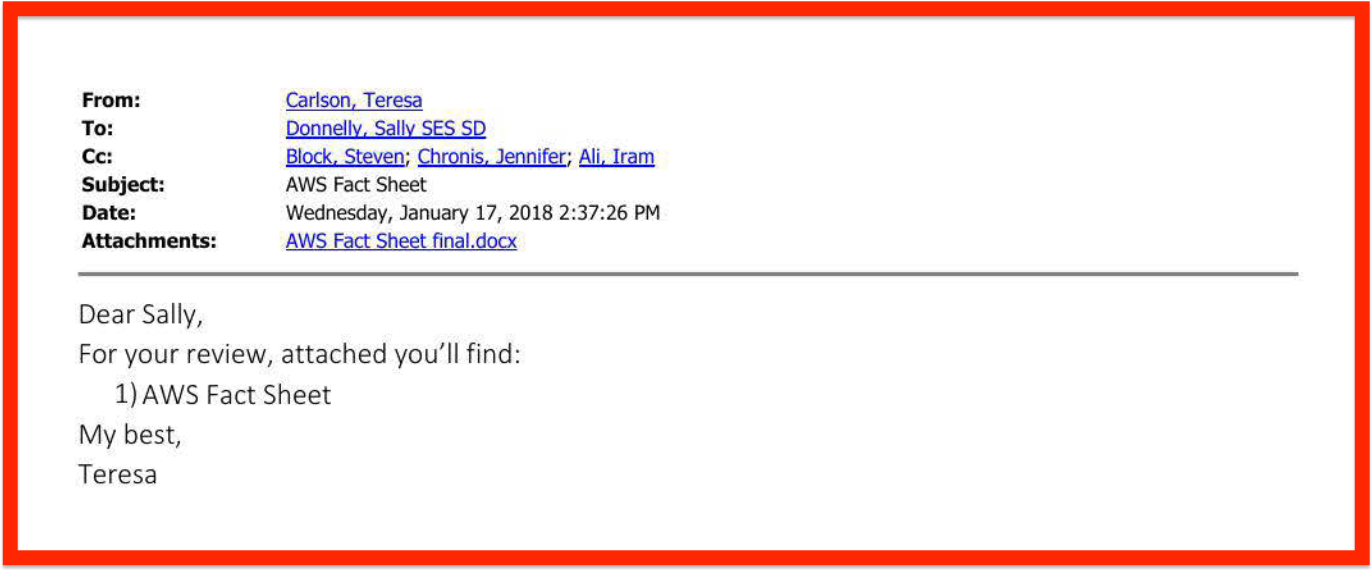
Email from Carlson to Donnelly sending an AWS fact sheet before Mattis is to have dinner with Bezos, January 17, 2018, obtained via FOIA.
ProPublica noted in its report that Donnelly “helped give Amazon officials access to Mattis in intimate settings, an opportunity that most defense contractors don’t enjoy.”
Republicans Could Thwart Amazon’s Future Pentagon Fortunes
With exoneration from the Pentagon inspector general, Donnelly is back serving as a Pentagon adviser under the Biden Administration, as a member of the Defense Business Board.
Donnelly serves on the board’s Business Operations Advisory Subcommittee, which according to its website provides “advice on opportunities for improvements in business processes and operations inside DoD.”
As a board member, she has a security clearance and access to the building. The board has already drafted a review of private sector best practices that discusses the use of cloud services.
Donnelly now has a new consulting firm, Pallas Advisors, where she has brought on a number of former senior defense officials, including DeMartino, Roper, Daigle, and Army Secretary Ryan McCarthy, who recently discussed cloud-related technology for a Defense News article.
A former Pallas board member, Ronald Moultrie, currently serves in the Pentagon as the under secretary of defense for intelligence and security. His hire reportedly raised worries he and other former consultants were now “in position to set and execute policy that could benefit their former clients.”
Although the Pentagon is hoping to turn the page on JEDI’s soiled history, efforts by Grassley or House lawmakers could impact the new program and future awardees.
Donnelly did not respond to a request for comment.
After the publication of this story, an Amazon Web Services spokesperson sent the following statement response to Breitbart News: “These are the same false, tired, and meritless allegations that have been repeatedly rejected by every independent review — from federal courts, to the GAO, to the DoD IG. This is nothing more than an attempt by certain less capable AWS competitors to distract from the fact that by every objective measure AWS provides its customers with superior technology, more secure and reliable services, and deeper experience supporting classified government workloads.”
Follow Breitbart News’s Kristina Wong on Twitter, Truth Social, or on Facebook.

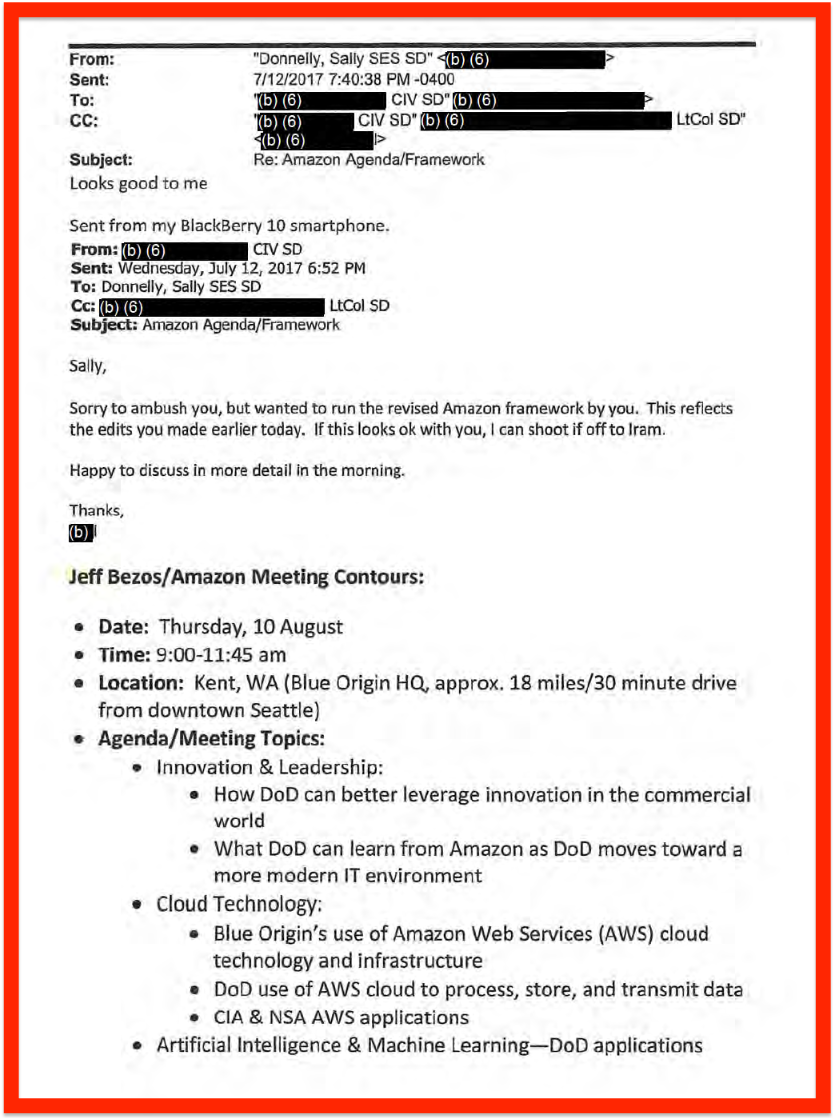
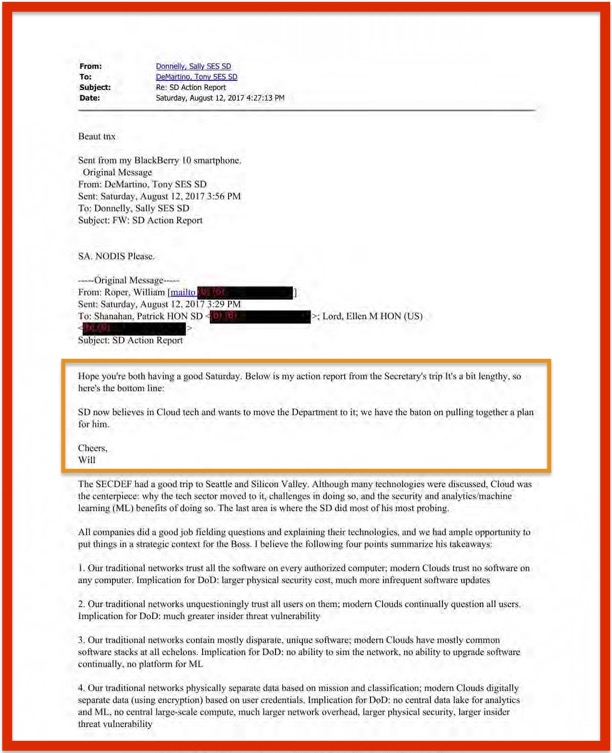
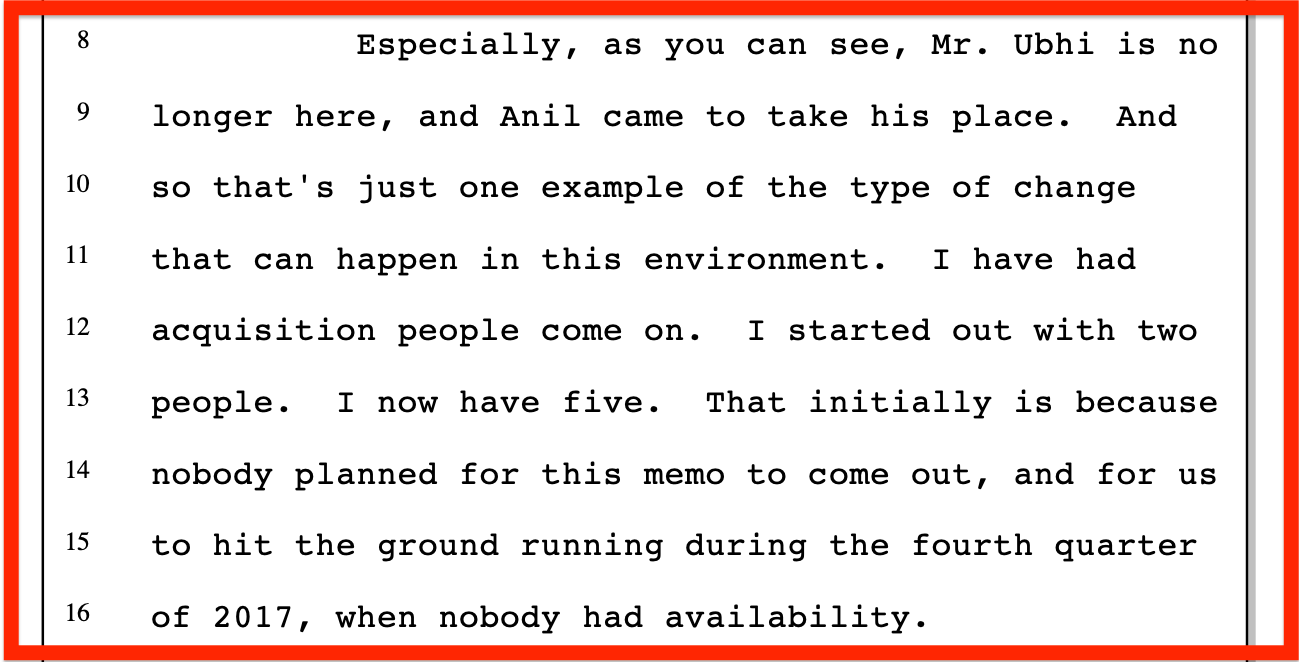
COMMENTS
Please let us know if you're having issues with commenting.